#dungeon meshi analysis
Text
Thinking about a certain scene in Dungeon Meshi that completely encapsulates the Autistic experience of making friends as an adult and how hard it is to try and navigate it without ending up getting hurt.
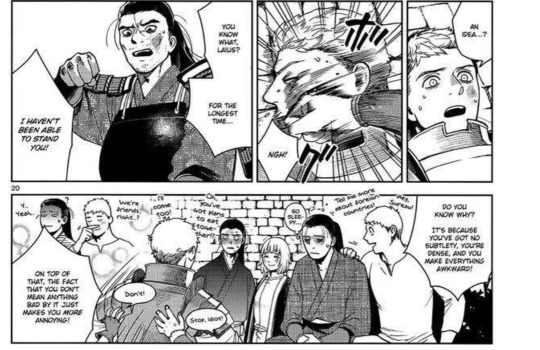
Like IDK about y'all, but this is a common problem ALOT of Autistic Adults face when trying to make friends with other people, because unlike children who aren't good at keeping their opinions to themselves, Adults ARE. In society, we're even encouraged to "keep the peace" "be polite" and etc, which commonly leads to awful scenarios as shown above when Laois finds out his buddy has come to resent who Laois is without actually telling him. All too often the friends that we love to hang out with, people that we're so happy to spend time with, don't feel the same way and in many cases, come to blame us for our social cues or lack thereof.
And when/if we do eventually find out how our friend feels, Dungeon Meshi hits us with another painful panel of how that usually ends up playing out.
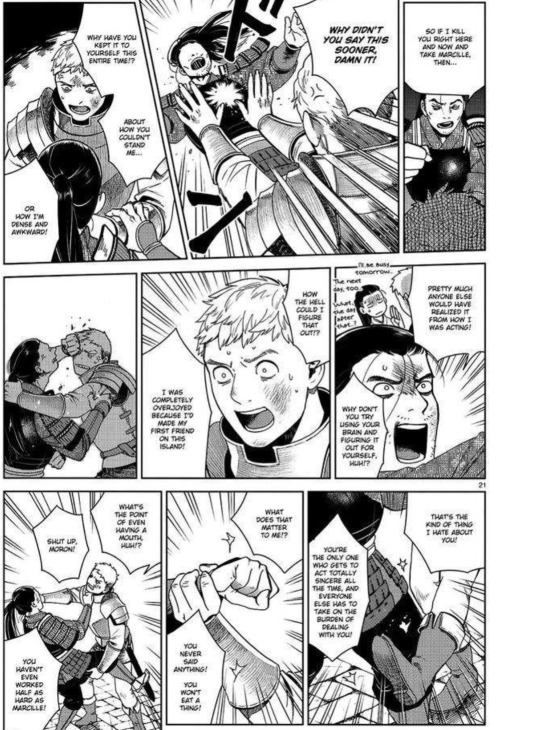
It's hard for Adults with Autism to make friends, and even harder to maintain them because alot of the ways Neurotypicals tell other Neurotypicals that they don't like a certain behavior is by quietly disengaging. Whether that involves having one sentence answers, going quiet, or having a certain tone in their voice, all those things signal annoyance or disapproval, but for the Neurodivergents, those subtle cues are completely missed.
And yet when we inevitably discover we DID do something, it is natural to ask "well why didn't you tell me?" because in our minds, it should've been the next step in the equation. However for the Neurotypicals, that's NOT something to bring up. Its important to be SUBTLE about the issue at hand and rely on signals to tell the other person. Blame is placed on us for not noticing the "obvious" signs of disapproval rather than the idea of talking it out as such things are uncomfortable and harder to do. Alot of the time what ends up happening is resentment due to the idea that it was "obvious" and the fact one didn't notice indicates a deliberate ignorance rather than a complete unawareness. It ends up calling into question our quality as a person and our sincerity. We get called "fake" or "malicious" or even "stupid" for failing social cues rather than questioning the decision to be indirect and vague.
For a manga about exploring the dungeon, it seems that the artist would rather explore very real and prevalent dynamics in society with the adventuring premise as a backdrop. I felt VERY seen in these panels, and many others, because it happens so suddenly and dare I say it, plainly. There's no dramatic build-up or spectacle made and in essence, it just Happens.
I think that's what makes the scene hit even harder. It seemingly comes out of nowhere for Laois, like how it always comes out of nowhere for alot of people, and it's never a dramatic twist either. It's always mundane and hurtful. A sudden unforeseen bump in the road that ends up calling into question one's entire friendship with someone and consequent other friendships. It asks "what if other friends feel the same. What if the people that I really like actually hate me and I don't know it?" Or at least that's what I came away with after reading the chapter. I've been where Laois was and the only reason I'm not there now is because I lost the naivete I had and doubt everyone else's sincerity.
#dungeon meshi#delicious in dungeon#laois touden#laois dungeon meshi#ryoko kui#dungeon meshi analysis#autistic things#autism#adults with autism#autistic adult#neurodiversity#neurodivergent
4K notes
·
View notes
Text
Kabru, impossible mutual understanding & unknowable objects
Despite his concerted and constant efforts to understand other people, it’s established in a few extras that Kabru believes that true mutual understanding between certain different races is impossible. Specifically, between long-lived and short-lived races, and between humans and demi-humans. Partially, we can trace this conviction back to specific hang-ups caused by his life; the trauma of the Utaya disaster, prejudices he carries from his childhood, and his experience of racism among the elves. In this “little” essay, I’m gonna discuss how I think those experiences formed this belief, how it comes out in his actions, and how some of his actions seem to contradict it. The question of whether it’s possible to reach mutual understanding with other living beings despite our differences is one of the core themes of the manga, and I’ll also touch on how this aspect of Kabru’s character links to that.
Seeking understanding
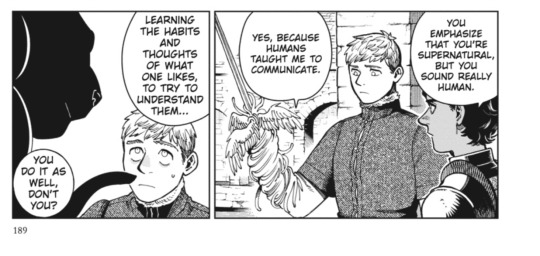
Kabru is a character who devotes a huge amount of time and effort to understanding people, and he is very good at it. In his internal monologue, we can tell how advanced and complex his skills of analysis are. He is able to read a huge amount of information just from looking at people's faces and body language.


People are, to him, what monsters are to Laios. This is something that's been expanded on at length in other, excellent meta. It's the fact that they're foils; it's the fact that Kabru is also very easy to read as autistic, with a special interest which is the opposite and parallel of Laios'. It's something that came out of trauma and alienation, as Laios' special interest in monsters also began as a coping mechanism.
The complicated origin of this "love" for monsters and for people comes through, I think, in the fact that one of the places we see both characters use their fixation is in being very, very good at killing the thing that they love. This also ties into the idea that loving something isn't even remotely mutually exclusive with using it to sustain your own survival; using it for your own purposes; hurting it or killing it. Love can be, and often is, violent, possessive and consumptive. This understanding is part of what makes Kui's depiction of interpersonal relationships so compelling to me.
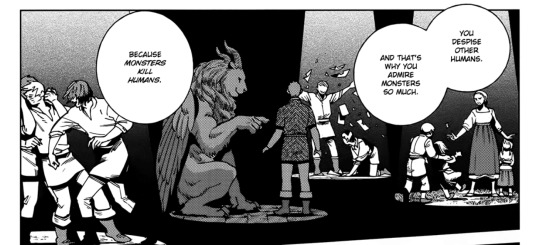
While Laios fixated on monsters and animals to seek a place of escape, in both his imagination and his self-image, from the humans who he couldn't understand and who couldn't understand him, Kabru seems to have fixated on understanding people in order to navigate the complex, socially marginal places that he has been forced into throughout his life. As an illegitimate child raised by a single mother with an appearance that marked him out as different to the point his father's family wanted to kill him, and a tallman child raised among elves who didn't treat him as fully human and wanted him to perform gratefulness for that treatment – treatment that, after he met Rin at age 9, he certainly always understood could be a lot worse – his ability to work out what people wanted from him, whether they were friendly or hostile or had ulterior motives, wasn’t just an interest. It will have been an essential skill.
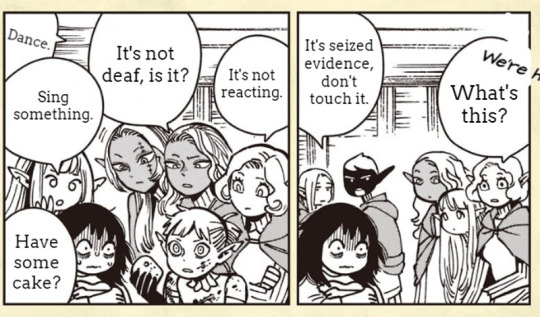
Milsiril, I think, was a flawed parent who tried to do her best by Kabru and did a lot of harm to him despite her best intentions. She may have treated him much better than an average elf would have, but like Otta and Marcille's mother, there are other elves with different outlooks on short-lived races. How would they judge her treatment of him? We don’t have any insight on what it could be, but to be honest, the person’s whose opinion of her I’d be most interested in knowing is Rin’s.
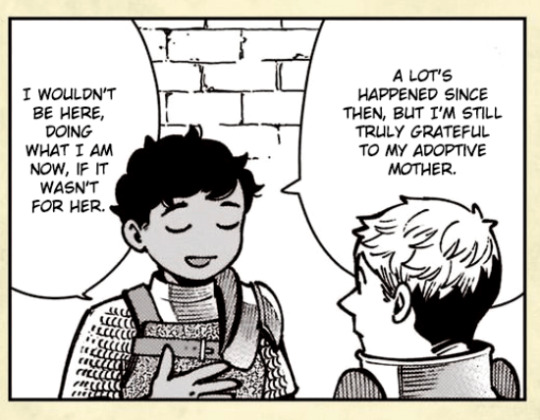
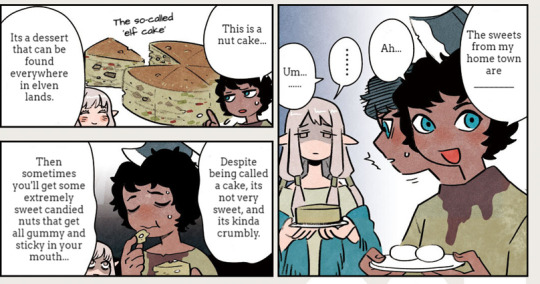
But even if she'd been perfect, living as an trans-racial adoptee in a deeply hierarchical nation with a queen who is a 'staunch traditionalist' who wouldn't even acknowledge the existence of a half-elf like Marcille (according to Cithis) is an experience that would deeply impact anyone.
Elves & Impossible mutual understanding
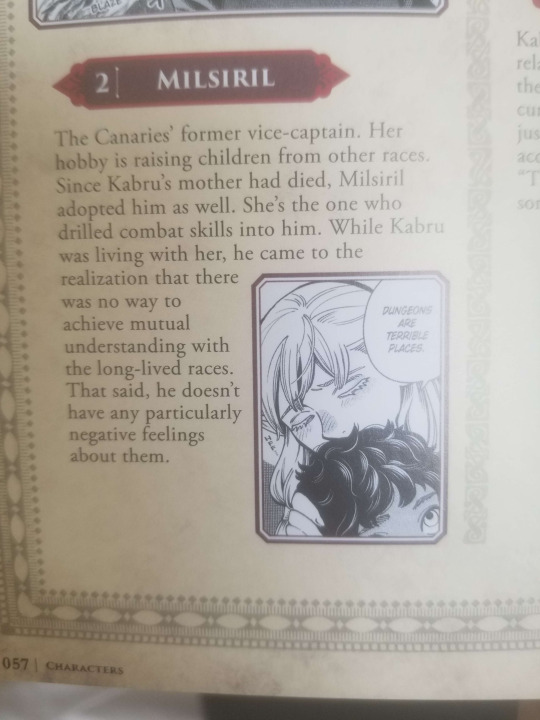
While Kabru was living with Milsiril - in other words, while living in the Northern Central Continent - he came to believe that "there was no way to achieve mutual understanding with the long-lived races."
This is evident in his political project: he wants short-lived races to have ownership over the dungeon's secrets. Despite his dislike of the Lord of the Island, he's a useful bulwark to stop the elves taking over. Despite his doubts about Laios, Laios needs to be the one to defeat the dungeon, because if he doesn't the elves will take over.
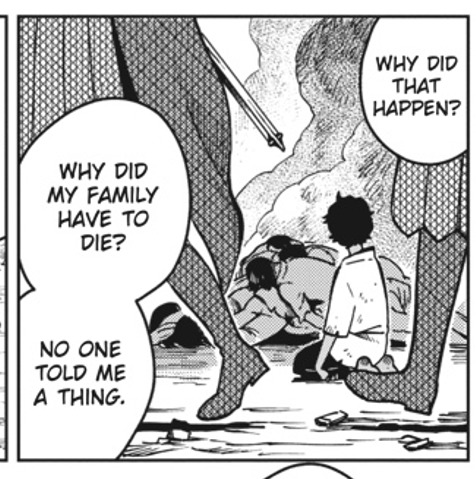
Kabru still carries a deep scar from Utaya, one that was exacerbated by the fact that he never got an answer to any of his questions about what happened or why. This, despite the fact that Milsiril knows about the demon and how it works. Do you think Kabru, with his social perceptiveness that borders on the superhuman, wasn't aware that she knew more than she would tell him?
Given that, the fact that he gets to a place where he "doesn't have any particularly negative feelings about [elves/long-lived species]" .... well, to put it bluntly, I believe that he thinks that's the case, but I kind of doubt it. After all, if he did have resentment, of Milsiril (someone who was his primary provider and caretaker since age six, and who despite her flaws, loves him and who I do think he loves) or of elves (who he has had to play nice with for most of his life, in order to survive, and will still have to play nice with in order to achieve his goals, since they hold all the power) what would that do except hurt him and make his life harder? Kabru is Mr. Pragmatic, so I don't think he'd let himself acknowledge any such feelings he did have. Exactly because he can't acknowledge them, they're well placed to get internalised as beliefs about the Fundamental Unchangeable Nature of the World.
However, these stated beliefs seem to contradict his actions. Despite his belief in the impossibility of forming a mutual understanding, he certainly seems to try to understand long-lived people, just as much as he does short-lived people. There's no noticeable difference between his treatment of Daya & Holm versus Mickbell & Rin that isn't clearly down to their relationship with him. His skills of human analysis were honed and developed while living amongst elves, and as soon as he's alone with Mithrun he immediately sets to understanding him - his interests, his motivations, his needs, and his past.
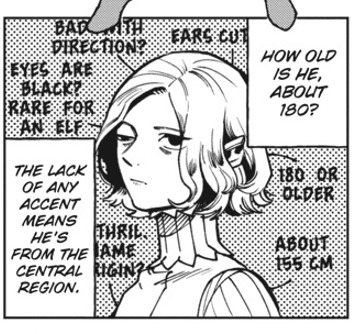
He treats him considerately and without bias, and despite the fact that Mithrun conquering the dungeon for the elves is both a reenactment of a core part of his childhood trauma and a political disaster for his aims, that doesn't seem to colour his perspective on Mithrun negatively at all.
This is something I find extremely laudable about Kabru, and it's another way he parallels Laios. He seems to understand that people, as a rule, (in Laios' case, he understands this about monsters - and eventually, all living beings) will act in their own interests, and if those interests conflict with yours, might harm you. But that's just their nature, and it's not something that should be held against them; you're also doing the same thing, after all. The crux of Laios' arc is precisely that he has to accept the responsibility of hurting someone else in order to achieve what he wants.
Kabru is deeply concerned with his own morals, what he should and shouldn't do, but mostly in the context of responsibility for the consequences - a responsibility he takes onto himself. He isn't scrupulous about what he needs to do in order to create the outcome he wants, but if he fails to create that outcome, then....
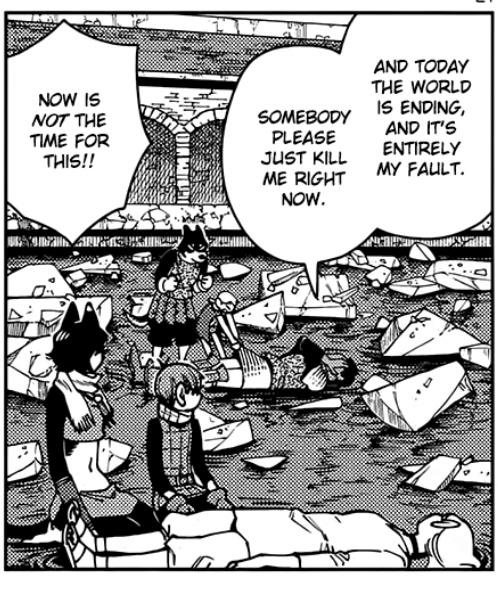
He blames himself to the point of thinking he should die. He doesn't blame Laios, or seem at all angry with him, despite concluding he should have killed him to prevent this outcome. That's because in his eyes, ultimately Laios was going to act according to his own nature, and it's Kabru's fault for not understanding that nature well enough. He's extremely confident in his ability to understand and predict others, (including elves and other long-lived people). Then, where does his conviction that mutual understanding is impossible come from?
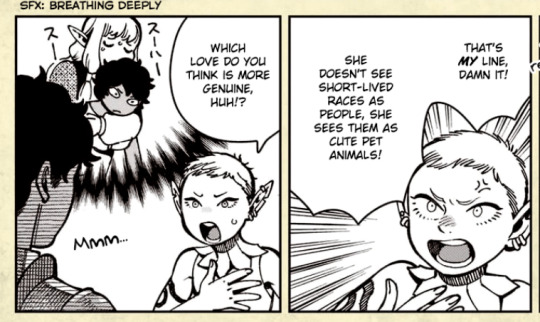
Partially, it's the "mutual" part. I'm sure Kabru, who isn't able or willing to deny Otta's insinuation that Milsiril saw him more like a pet than a son, has felt that his full interiority, the depth of his feelings and his ability to grow, act, and think as a fully equal being, was something that the elves around him just couldn't grasp. Because that was their excuse for it, he came to understand this as a gulf between short-lived and long-lived beings, an inevitable difference in outlook caused by their different lifespans.
This experience might be part of what leads to his iconic “fake” behaviour. He trusts his ability to understand others, but if they aren’t able to understand him, then there isn’t any benefit to being honest about his feelings and thoughts. If his attempts to reach mutual understanding with his caretakers were never able to be fulfilled, then it isn’t any wonder that he reacts with such surprise and horror at blurting out his desire to be Laios’ friend.
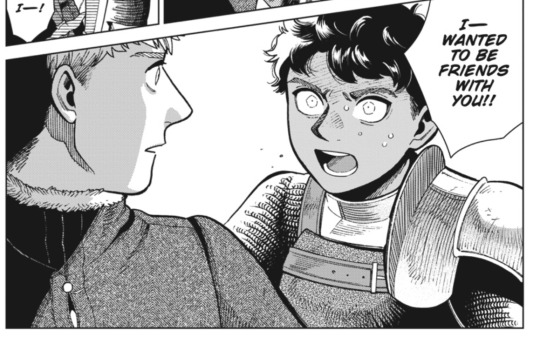
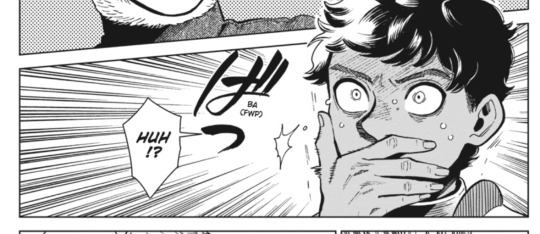
In his experience, making yourself vulnerable in that way only leads to being hurt. Soothing him, hushing him, lying to him, talking to him like a child that isn’t able to use proper judgement – that’s an inadequate and deeply hurtful way to respond to genuine distress, the desire for autonomy, or disagreement. Ultimately, I think that’s why he comes out on the side of being grateful to Milsiril; because she did equip him with the skills and knowledge he’d need to reach his goal, and let him go.
Though he could understand them, they couldn't understand him. To the extent that was true - which I'm sure it was - it wasn't due to anything about lifespan. It was due to the elves’ racism, and the solipsitic mindset & prejudiced attitude that it caused them to approach him with.
Because, if it needs to be said, the idea that there is an unbreachable gap in understanding between the long-lived and short-lived species is not true. Marcille and Laios have a much greater difference in lifespan than any full elf from any short-lived person, and they’re able to understand each other – maybe not perfectly, but better than many other people who are closer in life-span to them.
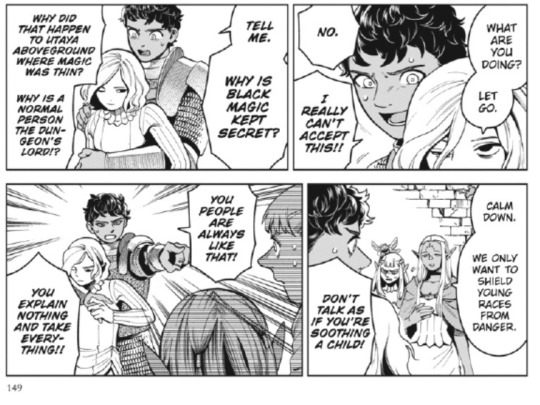
That doesn’t mean that I think Kabru is wrong about this, however. Because there’s an interpretation of his statement that is reflected in his actions and is true. When he talks about his problem with elves, it’s not just their attitudes: it’s their power, and what they use it to do. They “explain nothing and take everything”. Though it’s presented in the guise of ‘guiding and protecting’, in fact it’s a simple case of a powerful nation using their military power, wealth, access to resources, and historically stolen land – including the island itself – to protect their own interests and advance their own agenda. That’s why they’d be able to show up, seize the dungeon, and forcibly take Kabru’s party and Laios’ party to the West. If Kabru wants to stop that from happening, or change that status quo, persuasion or a bid to be understood would be completely pointless. Between the political blocs formed by long-lived species and the interests of short-lived species, “mutual understanding”, given their current, unequal terms, would be impossible. This is something that we see reflected in Kabru’s actions; before he asks his questions about the dungeon, he grabs Mithrun as leverage. He never really attempts to persuade the canaries to see his point of view, because that would be pointless: they’re agents of the Northern Central Continent’s monarchy, and will act in its interests regardless of any individual relationship with him.
I don’t think Kabru sees the different dimensions of this belief of his in quite such clear terms, however, as is evidenced by the other group who he thinks it’s impossible to communicate with.
Demi-Humans & Unknowable Objects
The other place that we see his conviction about the impossibility of mutual understanding is in the kobold extra.
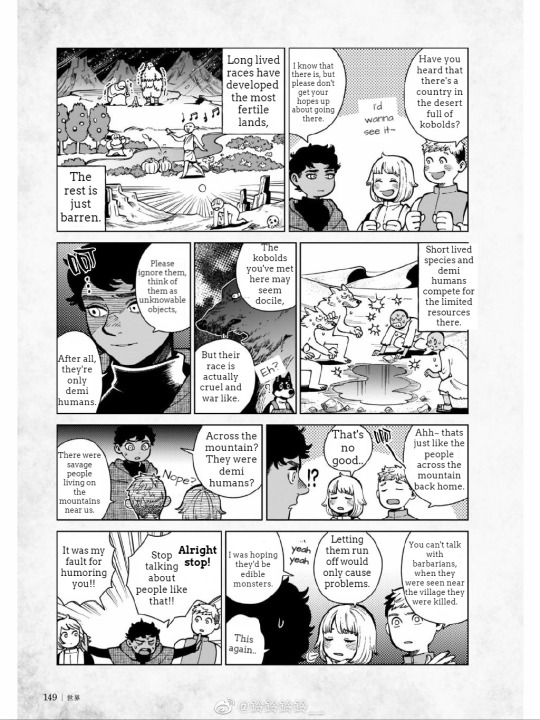
I'm including the whole thing, because I think it's an excellent and clever piece of world-building. Aside from what it says about Kabru, which I'll expand on shortly, what this extra does is deconstruct and call into question the usual "fantasy ontological biology" present in these sort of DnD-like settings. Essentially, the kind of worldbuilding where a race (such as kobolds) can be described as war-like, and that's establishing something essential about their biological nature. That's common to the point that if Kui didn't include this, some people would probably come away thinking that's the case about, e.g., the orcs.
But here, despite what Kabru is saying, the information the reader actually gets is:
the conflict between short-lived humans and demi-humans such as kobolds is mostly over access to material resources that they need to survive.
These resources are scarce because powerful nations, such as the elves, have monopolised them.
Kabru, who has grown up in a place at the centre of these conflicts, ascribes essential, negative traits to a cultural group which was in direct conflict with his own. Communication with this other group is impossible; they aren't people, they're more like objects.
oh yes! just like this conflict between groups of tall-men, a conflict which the reader will immediately interpret as more clearly analogous to real-life racism. Our other protagonists also carry prejudices from growing up in a place where a marginalised group was in conflict with the dominant group over scarce resources. It's definitely impossible to communicate with these people, and you can only kill them.
Woah, when you say it like that, it sounds pretty bad!
But also, nobody walks away having had a realisation or unlearned their prejudices - because they don't have the tools they need to do that work. Yet. I do think, to an extent, it could happen - especially with Kabru, since it's suggested in the epilogue that Melini might become a safe-haven for demi-humans.

To focus in on Kabru, the key here is his statement that you should think of demi-humans as "unknowable objects". Even his extraordinary powers of understanding have seemingly hit a limit. Part of this is just inherited prejudice, and doesn't need to have a complicated psychological explanation, any more than the elves who were prejudiced against him need one.
But also... this is probably somewhat linked to the way demi-humans seem to be considered "pseudo-monsters". They're the place that the strict delineation between the human and the monstrous is permeated. Laios, who is not interested in humans, remembers and is excited by Kuro. Chilchuck and Laios argue over whether it's OK to eat a mermaid. Kabru's prepared to (pretend to) roll with the idea that Laios ate the orcs.
But these are people, aren't they? Of course, this is a social construction, as we see from the fact that in the Eastern Archipelago, the label of "human" is reserved for tallmen, but in most of the rest of the world it depends on some obviously arbirary classification based on number of bones; "demi-humans" aren't in any essential way monstrous, except to an extent in their appearance, and physical location - due to their marginal social status, they're pushed out to live in unsafe places such as dungeons.
Therefore, Kabru's view of demi-humans as fundamentally "other", unable to be understood - monstrous - could be read as akin to abjection, the psychoanalytical concept described by Julia Kristeva. In order to create a bounded, secure superego, that thing which permeates and calls into question the border between self and other, human and animal, life and death, is rejected and pushed to the margin.
“Not me. Not that. But not nothing, either. A "something" that I do not recognize as a thing.[...] On the edge of nonexistence and hallucination, of a reality that, if I acknowledge it, annihilates me. There, abject and abjection are my safeguards. The primers of my culture.” (Kristeva et al., 1984, p. 11)
“It is thus not lack of cleanliness or health that causes abjection but what disturbs identity, system, order. ” (Kristeva et al., 1984, p. 13)
“The pure will be that which conforms to an established taxonomy; the impure, that which unsettles it, establishes intermixture and disorder. [...] the impure will be those that do not confine themselves to one element but point to admixture and confusion.” (Kristeva et al., 1984, p. 107) (discussing food prohibitions in Leviticus)
This is both (due to its affinity with food-loathing and disgust) a very fruitful concept to apply to dunmeshi, and a psychoanalytical theory which I wouldn't exactly cosign as True Facts About Human Psychological Development. You may also know the abject from its utilisation in the classic essay "Horror and the Monstrous-Feminine" by Barbara Creed - that's a lot more approachable than Kristeva if anyone's interested.
Key here, though, is that through the symbol of the "demi-human" is embodied a step between "human" and "monster" - and that's a prospect that puts at risk the whole notion of an absolute separation between those two categories in the first place. To Laios, that's something wonderful, and to Kabru, it's terrifying. We can see this principle further embodied in the relationship both characters have with the notion of becoming monstrous.
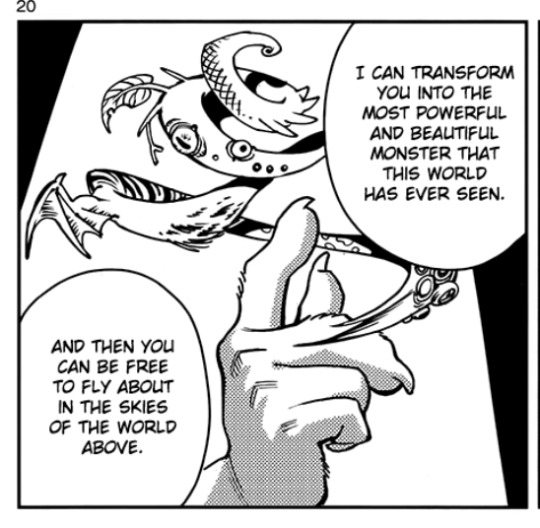
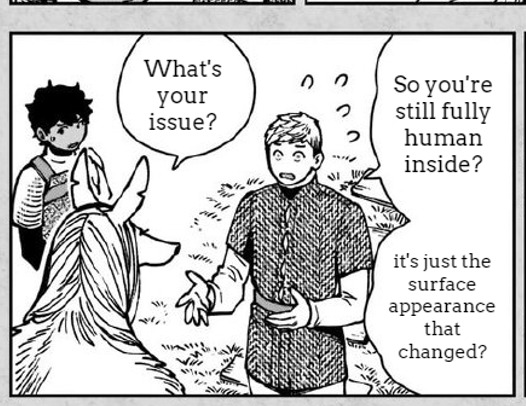
To Laios, this is transcendent, and represents a renunciation of everything human - in fact, if it didn't, it wouldn't "count".
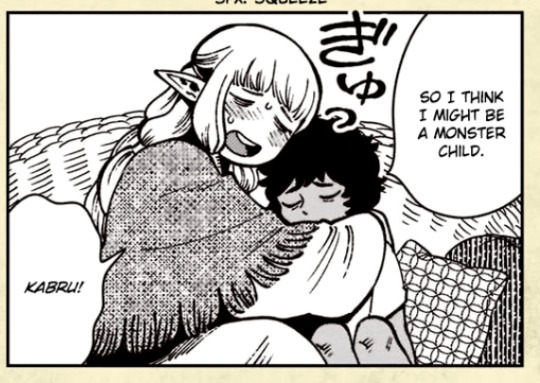
To Kabru, it's a deeply-held fear, established by his childhood alienation (due to his illegitimacy, his eyes, and perhaps also his neurodivergency), deepened by monster-related trauma and the sense of responsibility and survivors guilt he feels for what happened at Utaya. His identity as a human who is not monstrous is key to his sense of stability and safety; he doesn't want to touch monsters, he doesn't even want to see them.
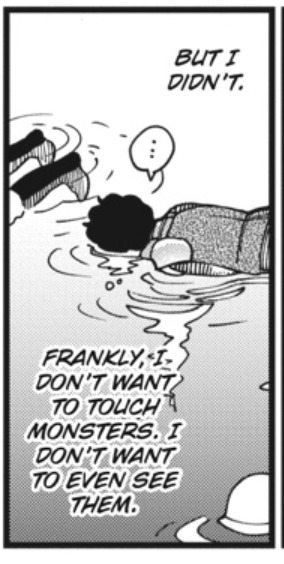
To acknowledge a kinship, a possibility of similarity between the things he loves (humans) and the things he hates (monsters) would be more than touching them - it would be putting them inside him. We know, quite explicitly, that this notion is triggering to Kabru. He literally has what seems to be a flashback when he's about to eat the harpy omelette.
So he abjects it, classifying the demi-human as fundamentally unlike him - an unknowable object, or an object that he refuses to know. Because in understanding it, he would interject the things he hates and fears into his self, which is already, always under threat by that hated and feared object.
Of course, again, Kabru isn't very good at enacting this refusal in practice. For one, when he chooses between his desires and ingesting the feared object, eating monsters... he eats monsters. Part of this is treating himself badly, the "ends justify the means" mentality. His goal is to destroy all monsters, so if he needs to become monster-like to do that, he will. But part of it is also the other motivation that he didn't even seem to know about until he said it: he wants to become Laios' friend, and to learn from him how a person can like monsters. He wants, at least in some part of him, to reconcile the feared and hated object into something he can understand.
For another:
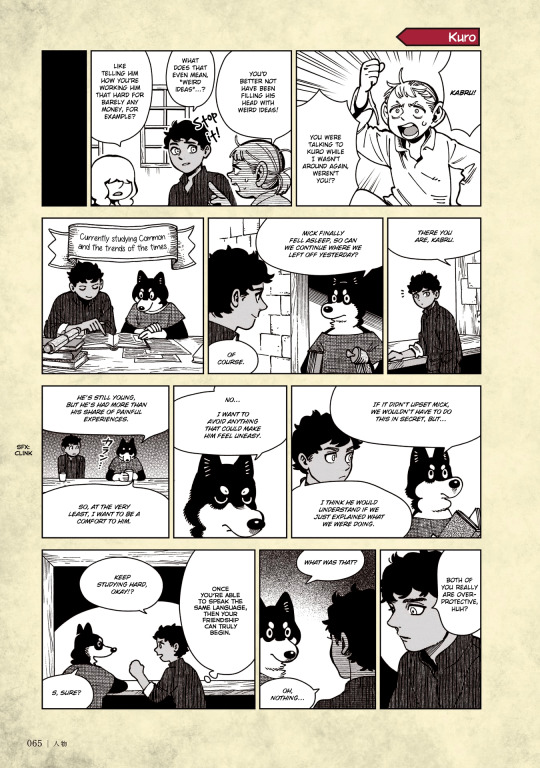
Kabru can speak the kobold language. In the first place, while this may have been common in Utaya, it also could have been something he chose to learn, an early expression of his interest in understanding and talking to all sorts of people. It isn't the kind of thing you learn if you believe that communication between yourself and the group that speak it is impossible, is it?
It's possible to harbour prejudices against a group while being kind to an individual, and given Kabru has those prejudices regardless of his reasons, that is what he is doing. But also, his treatment of Kuro doesn't reflect a sincerely held belief that he's an "unknowable object" at all. His approach is exactly the same as it is to any other person: an analysis of goal and motive, and an attempt to help if he's sympathetic and their goals align - going out of his way to give language and local knowledge lessons in secret. His conviction that Mickbell and Kuro will truly become friends when they can properly communicate is completely contradictory to any sense of demi-humans as fundamentally different, or impossible to reach mutual understanding with. To me, it seems like this self-protective shield against the corruptive force demi-humans as an idea present to his identity, this abjection, when Kabru is face-to-face with one, just simply can't hold up against his finely honed skill of intellectual empathy. Perhaps because he's autistic, it seems his "empathy" is less an emotional mirror response, and more a set of cognitive skills for analysis of others. That instinctual, emotional empathy might not trigger when presented with a member of an out-group, but if it’s possible for Kabru to turn his cognitive empathy off, we don’t see him do it.
This isn't to say that this prejudice doesn't affect his behaviour. For one, it could negatively impact his judgement of politics and policy, where individual people don't enter into it. For another, I'm not convinced he'd be willing to overlook Mickbell's exploitative relationship with Kuro if Kuro wasn't a kobold. As it is, since both of them are satisfied, he doesn't feel like he needs to intervene, regardless of the fact Mickbell isn't paying Kuro. But if Daya and Holm were in a relationship, and Holm took both Daya's and his own share from their ventures, but only compensated her in living expenses and kept the rest, do you think he'd tolerate it, for example? Even if she said it was OK?
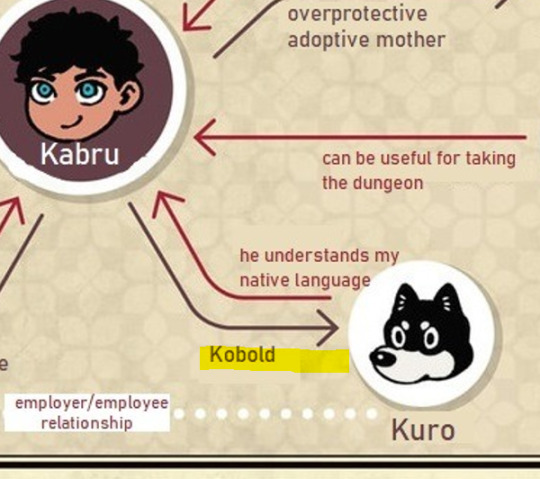
Conclusion

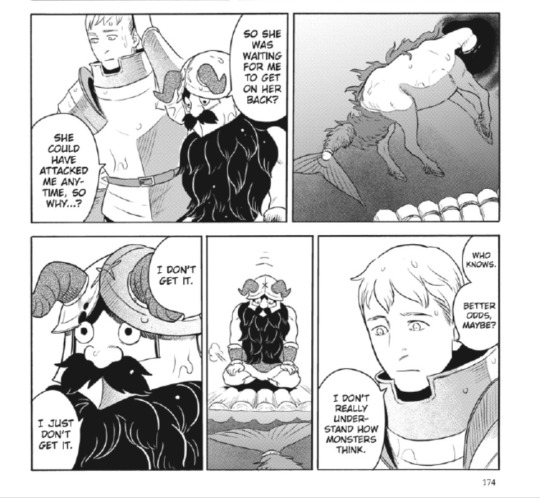
The kelpie chapter establishes that "people can never know what monsters are really thinking." That isn't just true of monsters, though.
True mutual understanding is impossible - between anyone. We can never truly understand another person's heart. This is touched on in, for example, the existence of shapeshifters and dopplegangers. Even a monster that seemed like a perfect copy of a person wouldn’t be that person, and wouldn’t be a satisfactory replacement.
We’re intended, I think, to understand the winged lion's repeated suggestions to just replace people who have been lost with copies as something uncanny, which demonstrates the way that the winged lion never manages to attain a complete understanding of humans. A version of a person who was created to fulfil your memories of them, to be the person who you wanted them to be, would be a terrible, miserable thing.
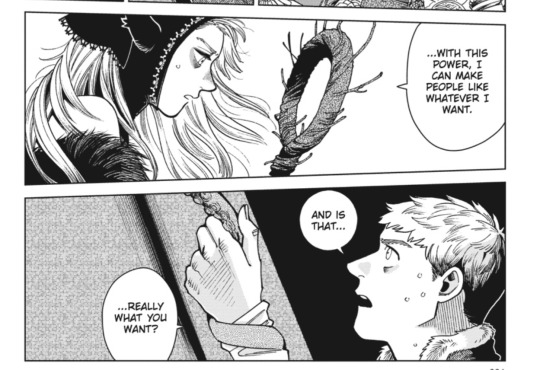
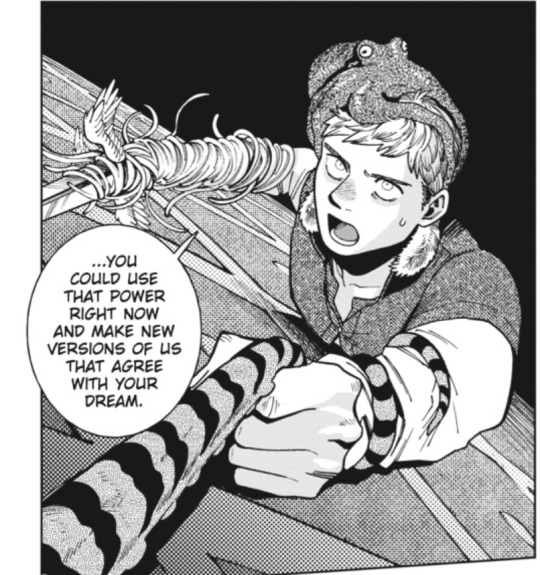

Disagreeing, coming into conflict, and misunderstanding each other, are essential parts of what it means to be living beings, as fundamental as the need to eat.
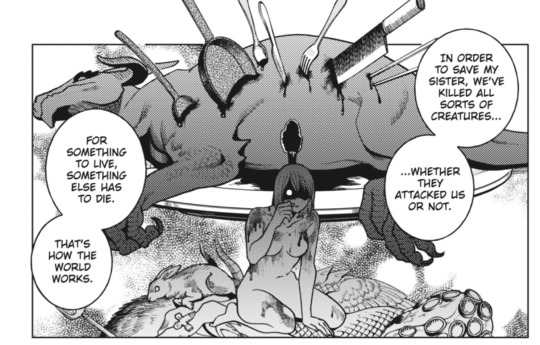
The only thing to do is not to take more than you need to eat to survive, and not impose your own desires onto others. To do your best to sincerely communicate your desires, even if they're embarrassing or vulnerable or strange, like Kabru eventually does with Laios; like Laios does, bit by bit, with the people around him; like Marcille does, Chilchuck does, Senshi does... to hope they will accept you, and do your best to understand them in return.
We can re-examine, in that context, Kabru's line about the elves' tendency to "explain nothing and take everything".
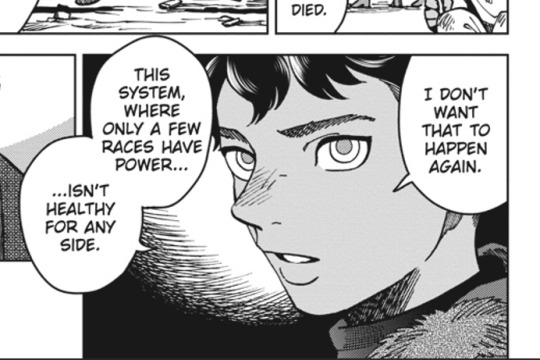
They have the power to impose their preferred "menu" onto less powerful groups. And in that context, mutual understanding being impossible just means that they won't give up their power because they're asked nicely. Kabru's goal is to seize the truth that they won't give to him, and to create a situation where they can't take everything. Because he's accurately surmised that nothing about the treatment of short-lived races will change so long as the power imbalance remains. Despite the way he mistakenly ascribes part of that to "long-lived vs short-lived" or "human vs demi-human", the actual gulfs in understanding he identifies are structural, are about power and about access to material resources and safety.
I think he could come to recognise this. Yaad is teaching him political science after all, and while a prince's lessons on political science won't exactly get at much that's radical or invested in the interests and perspectives of the marginalised (Capital is a critique of for a reason after all...) I believe in Kabru's ability to learn critically and get more from a lesson than it was intended to teach.
#og post#kabru of utaya#kabru dungeon meshi#laios touden#dungeon meshi meta#dungeon meshi#dunmeshi#dungeon meshi manga spoilers#dungeon meshi analysis#kuro dungeon meshi#the canaries#milsiril#continuing to develop my kabru theses.#literally sitting and thinking about kabru all day. rotating him.#he's in the microwave. to me.
317 notes
·
View notes
Text
I've been reading Dungeon Meshi and the cover for chapter 52 really stood out to me:
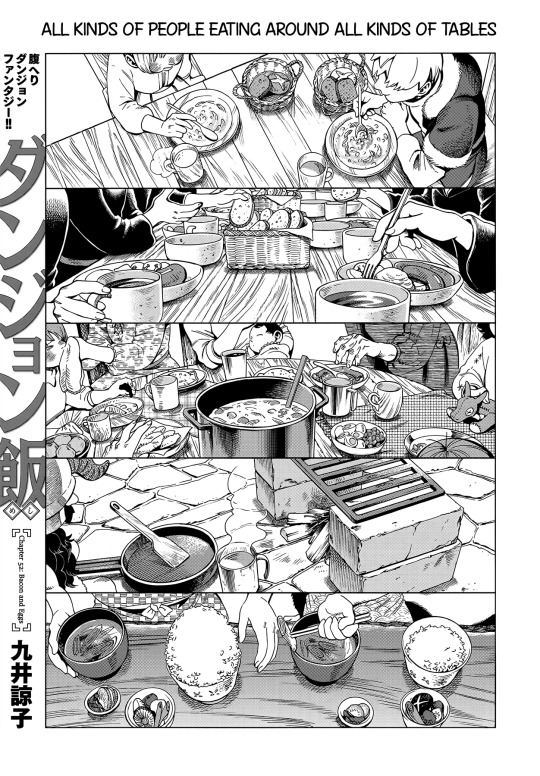
I think this cover so perfectly demonstrates the core themes that have been set up throughout the series thus far and also represents the characters really interestingly. Specifically the differences in their upbringings through the act of eating.
(Analysis under the cut ^_^)
First off, Laios and Falin are eating alone because they left home early in life and only have had eachother. They've had other party members but they've never enjoyed the toudens company like the two think they do, especially Laios. The two are alone because often times their party members don't actually care for them or see them as friends.
Marcille is eating in a cafeteria at her magic school, the composition is symmetrical to show the rigid lifestyle of the school and show how routine it is. It was a core time in marcilles life because she was happy and because it was structured. Often times, structure is the most comfortable thing someone can have, even if it is ultimately fleeting. School will end eventually and most of the connections you make are temporary but still effect us.
Chilchuck is eating with his family, showing the importance of his family to him. I really like this one in particular because even if his family is important to him, he'll always keep them at an arms length. His face is the only one shown, showing this about him. His face is also being cleaned by another person, showing the need for vulnerability and letting your gaurd down around people you care for, but also how Chilchuck is unwilling to do that.
Senshi is eating alone, he doesn't have a table either, showing how he lived in the dungeon for a long time and how he didn't have anyone to feed or care for even if it was something he deeply longed for. He's alone because he doesn't have anyone that could be there for him anymore, no family, no friends. I'm crying actually.
Finally, with Izutsumi she's eating with another person. Her table maners are poor, she can't hold chop sticks correctly and she's giving away the food she doesn't enjoy. We've seen this about her countless times but it's really amplified by this because it shows that she's always been like this, it's ingrained in her behaviour because no one either cared enough to try to teach her to be polite or never properly made an effort to. I'm sure Maizuru would try to fix her maners, but wouldn't do it in a thoughtful caring way that'd be actually helpful for izutsumi. She'd probably try to "whip her into shape" rather than treat her with compassion and patience.
All of these really accurately show how important connections are, how you need people. You need someone that will never treat you poorly, someone that will stick with you through thick and thin because they genuinely love you. You need the simplicity of routine, you need people that gravitate in and out of your life, those connections are important and often temporary but mean the most in the time you knew them. You need family, people you can let your gaurd down around and be truly happy with, even if it's hard to. You need people to care for, people you can feed and love in the simplest terms of helping them. And finally, you need people who teach you, people who will be there for you with kindness and treat you with compassion even when you are doing what they deem as bad.
I'm still not finished with this series but I genuinely love it so much so far. I'm barely halfway through and it's developed emotionally impactful and deeply honest themes and ideas that really strike a cord with me. It's so interesting and I can't wait to finish the series and better understand these characters ^_^
Thank you for reading all the way through!! Feel free to add your own bits of analysis or additional food for thought :33 (no spoilers tho please since I've still not finished the series)
#dunmeshi#dungeon meshi#delicious in dungeon#falin touden#falin dungeon meshi#laios touden#laios dungeon meshi#marcille donato#marcille dungeon meshi#senshi of izganda#senshi dungeon meshi#chilchuk tims#chilchuck dungeon meshi#izutsumi dungeon meshi#izutsumi#long post#text post#analysis#dungeon meshi analysis
160 notes
·
View notes
Text
Dungeon Meshi Evolutionary tree!
Quick note at the beginning: this is just me speculating, mostly based on how the diffrent species look as well as the bit of other info we get in the manga. I can‘t DNA-test them.
Evolutinary tree Number one:
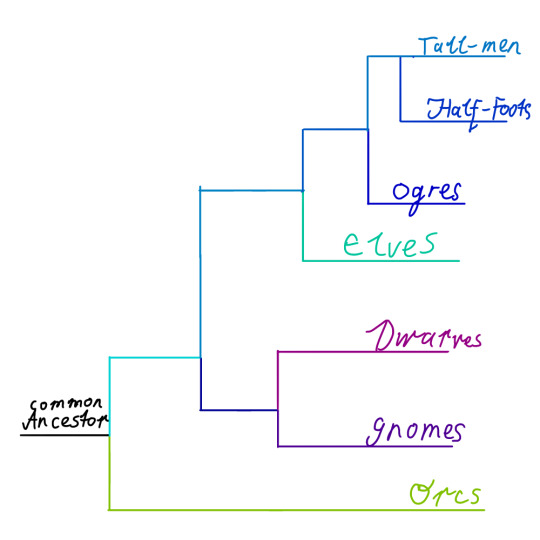
Evolutionary Tree Number Two:
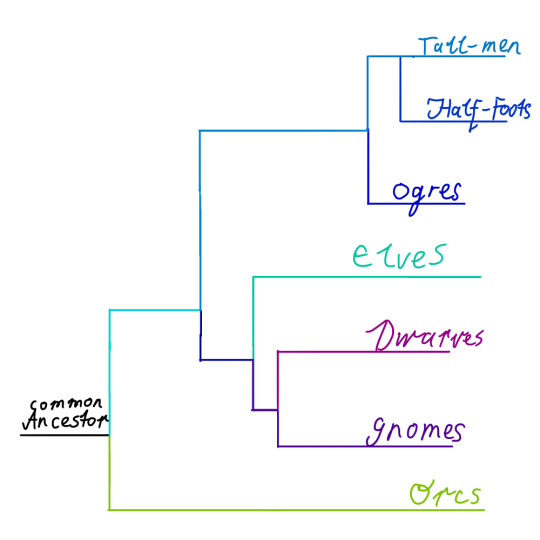
I think Orcs are the species who branched off first and is thus the most distantly related to everyone else. This is mostly based on the fact that they still have fur and very large canines, both traits that got lost very early on in human evolution, leading me to assume that they split off before those traits got lost in other humanoids. Orcs also have a noticably diffrent nose from all the others, so I assume that developed only after they split off. Them splitting off early would have allowed for more time for that to happen, as it only happend in their branch.
Now comes the point I‘m the least certain about: Did Dwarves and Gnomes split off, leaving Elves closer related to Tall-men, Ogres and Half-Foots (Evolutionary Tree Number 1), or did Dwarves, Gnomes and Elves split off together, meaning Elves are closer related to Dwarves and Gnomes (Evolutionary Tree Number 2)?
Number one is pretty much just based on looks, as Elves look very similar to Tall-men, Ogres and Half-foots, suggesting that they may be quite closely related, while Dwarves and Gnomes look a bit more „weird“. In this case Elves still split of earlier from Tall-men than Ogres did, as they are more diffrent from Tall-men.
Number two is based on the fact that Elves, Gnomes and Dwarves are all long-lived species and it would make sense for them to be closer related to each other.
I do assume in both cases that Gnomes and Dwarves are closer related to each other than to anyone else, beeing both short, long-lived races and sharing some other traits, most notably their big ears and big noses, giving them somewhat similar facial traits.
Now onto the last three Species: Ogres/Oni, Tall-Men and Half-Foots. My assumption is that Orge and Tall-Men are in kind of a Neanderthal-Homo Sapiens-Situation, with Ogres originating from a colder climate, which leads to them beeing overall bigger to better deal with the colder temperatures. (It is called Bergmann‘s rule, it has to due with the square-cube-law. Short version, bigger bodies have proportionally less surface area and thus loose less heat)
My theory for Half-Foots is that they are a offshoot of tall-men that shrunk due to insular dwarfism, as they look very similar to Tall-men except for their size, thus often beeing mistaken for Tall-Men children, and it doesn‘t seem like Half-Foots are very widespread. (Insular dwarfism also happend with Homo Floresiensis, a noticablly very small species of irl humans, it‘s super cool and where I got the idea from)
But wait! Didn‘t I forget somone? What about Kobold‘s?
Well, I have zero idea what to do with them. They have a dog‘s head and a fuzzy humans body.
Are they canids that convergently evolved to resemble humans? Are they the unholy creation of some mad scientist? I have no idea, if you have any, please tell me.
As for Beathkin, my understanding is that they don‘t occur naturally but need to be artificially created (or at least their ancestors were), so they didn‘t really evolve.
#dungeon meshi#worldbuilding#dungeon meshi analysis#speculative evolution#i‘m bored#and I have nothing better to do
26 notes
·
View notes
Text
the fact that kobolds seem to be this more "animalistic" race, with kuro talking in broken language and like improper grammar. this, coupled with the fact that he seems unaware of the fact that he's being exploited by mick, makes kobolds appear to be less intelligent than other races.
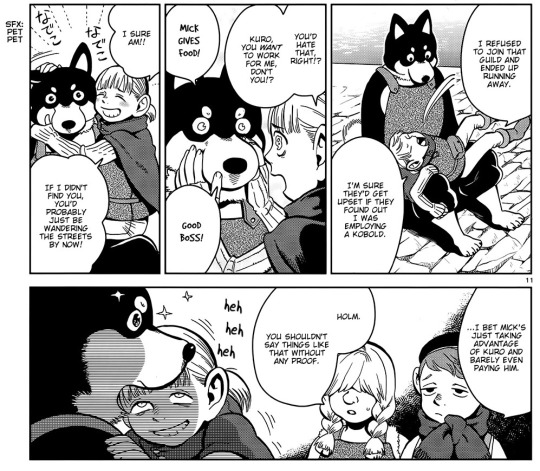
but we actually find out that the simple speech patterns are in fact due to common being kuro's second language. and in a scene where kabru talks to kuro in his native language, it's actually kabru with the simple speech patterns.

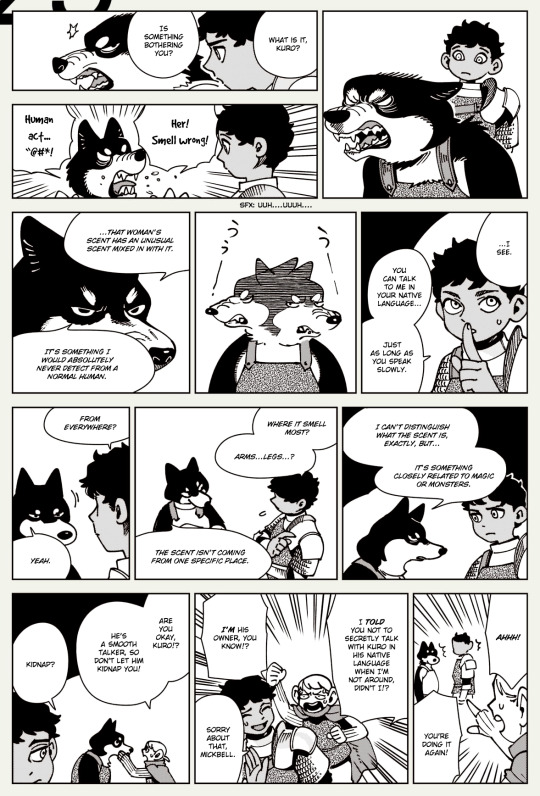
we even learn that kuro seems to actually have a much better understanding of his situation with mick than we first imagine. merely wanting to stay with them so they can have someone who they can feel relaxed around.
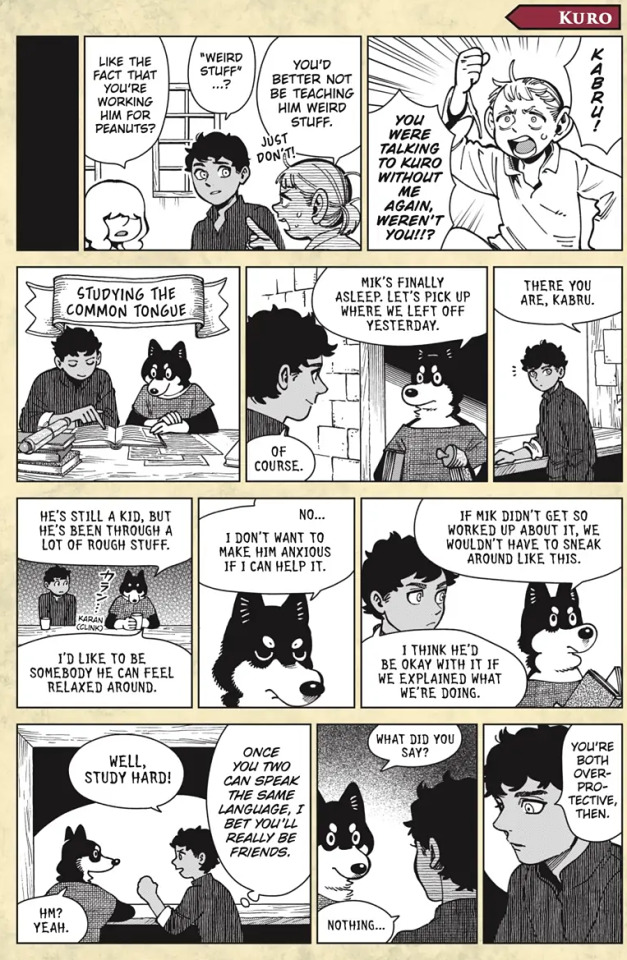
this, coupled with a bunch of other things, really makes dungeon meshi stand out from other fantasy media. there are no "dumb" or "evil" races, they're all just people.
23K notes
·
View notes
Text
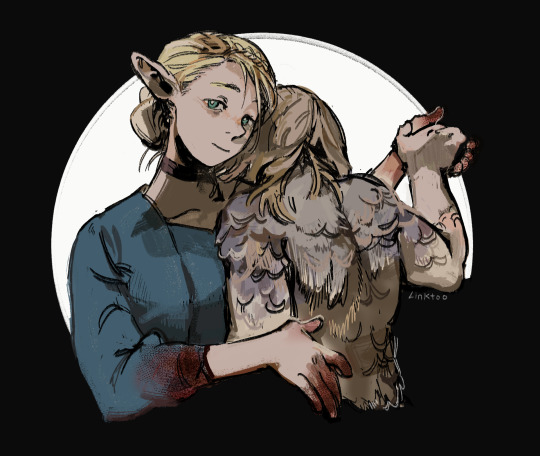
resurrection is sort of romantic, isnt it
#farcille#falin touden#farlyn thorden#marcille donato#dungeon meshi#delicious in dungeon#dungeon meshi spoilers#my art#Linktoo art#lets get that yuri on the road. who has a good analysis of these two. they have a lot of symbolism but I want to see like#someone get into the feelings they have for each other about how they see each other romantically. if that makes sense#tw blood
31K notes
·
View notes
Text

I've seen pieces from this extra comic before, but never read the full thing until today. And holy shit does it hammer home just how much the story is about class.
Multiple times, when food comes up in this comic, it’s also in context of money:
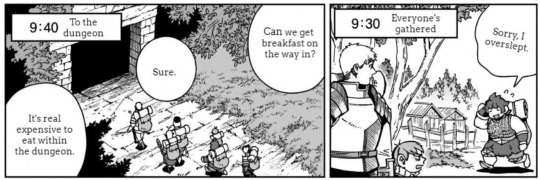
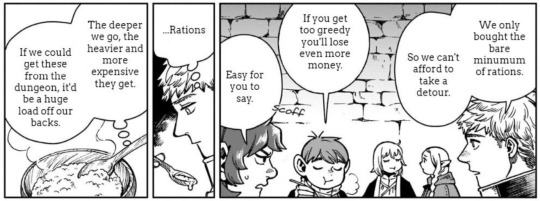
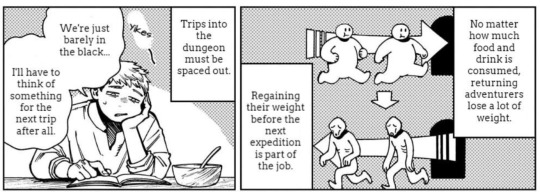
I've seen this last panel on the right brought up before in context of like, dungeon meshi's relationship with fat and eating, but in the full context of the comic it really hits how much adventuring directly consumes bodies for money.
As much as this has been part of the story the whole time, showcased as early chapters 19 and 20...
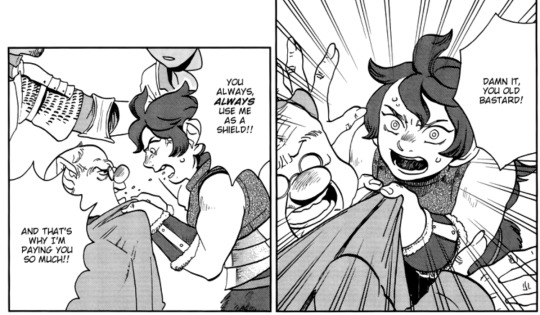
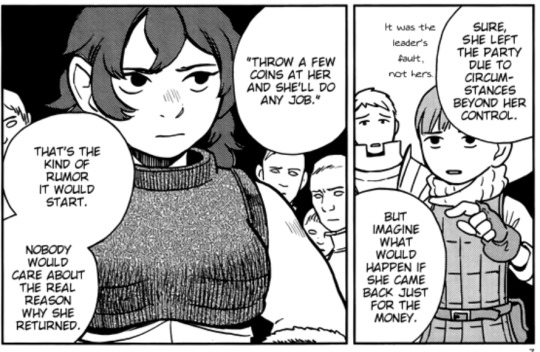
It never fully hit me before how often adventuring comes down to having no other way to make money but to throw yourself into death repeatedly. To be used, whether it’s by individual selfish people (like the resurrection group that is happy to try and get Kabru's group to kill each other to get extra gold from them in chapter 32), or by the greater cog of the Dungeon Economy in general.
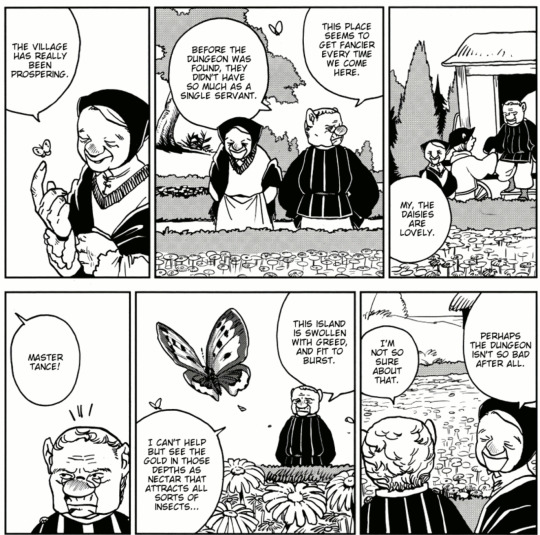
Which, to be clear, is all too often how things work in the real world, too. So many jobs burn through the health and lives of workers. Dungeon Meshi just makes it literal in a new way: by making the healing and resurrection, a core part to the adventuring loop, directly use fat, muscle, and energy from the body being healed.
Imagine Amazon, but if you got injured at work, they could literally burn up some of your body to get you back to working sooner. And that was seen as an advantage of the job.
And then you have Laios, thinking about eating monsters:
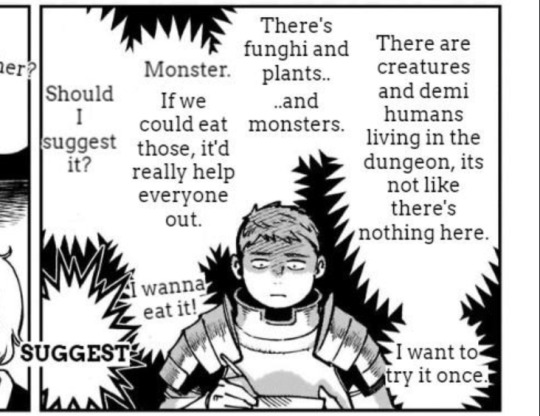
Not just because he likes monsters a lot. But because it would help. He says something similar in the actual manga too, during the chapter discussing his dream with the Winged Lion
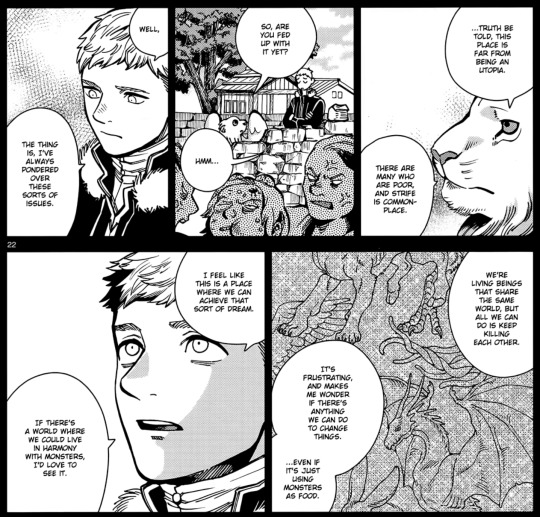
Laios wants to be able to make a home for Falin. He wants to give her a place where she never has to eat alone. And when he gets a party, he wants to give them a way to eat well. And when he runs a country, well…
He wants to ensure that everyone has enough to eat.
Food is political. Food ties into class, and money. What is deemed "proper" to eat, what is a luxury, what is crass… so much of it comes down to money.
Being judged for eating what's available, when what is “proper” isn't affordable, is already a thing that happens. People forced into work that consumes their energy is already a thing that happens.
Dungeon Meshi has a lot of fantastical elements, but boy is its examination of food and class very real.
#dungeon meshi#delicious in dungeon#laios touden#dungeon meshi spoilers#the full thing is up on mangadex and I v much recommend giving it a read#dunmeshi analysis
15K notes
·
View notes
Text
Time to talk an unnecessary amount about floors!

Episode 6 of Dungeon Meshi was produced in collaboration with a smaller studio, Enishiya - and it went way harder than I expected, for being made up of two relatively simple and self contained stories focusing on one character each.

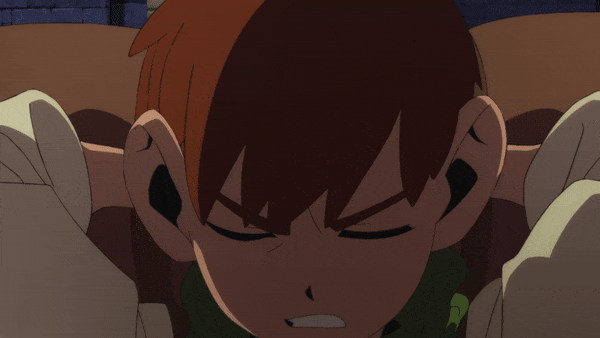
And you can really see how those extra resources meant the animators could give full focus to both halves of the episode. Let's take a look at one piece that stole the show.
The first half was handled primarily by episode director/storyboard artist Keita Nagahara and co-animation director Hirotoshi (or Hiroaki? [1]) Arai. It's actually kinda insane how much of this section can be attributed to these two.
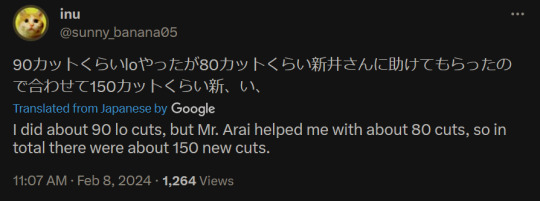
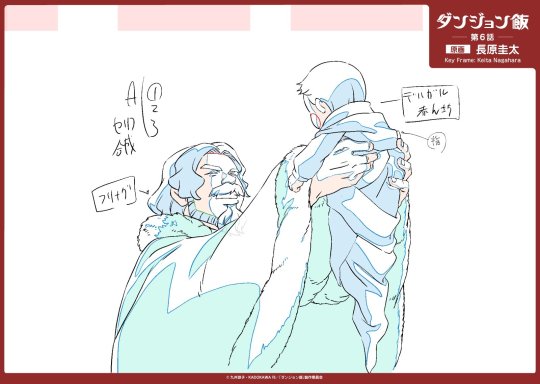
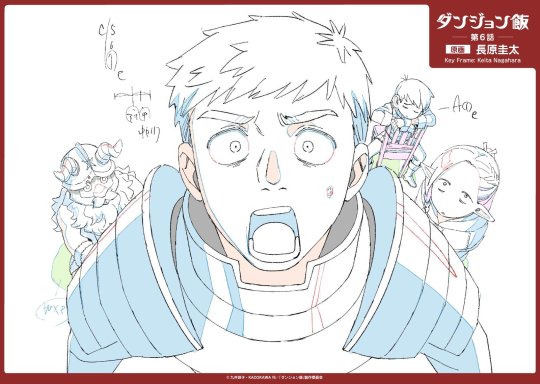
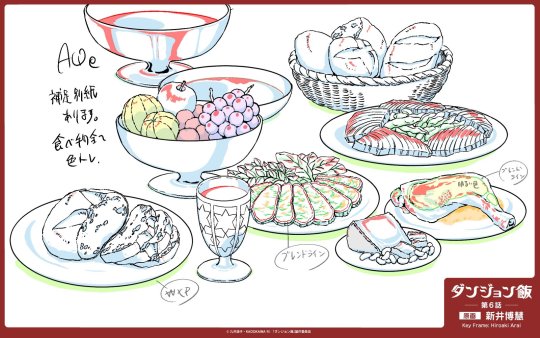
But the real star of the show is the second half, Chilchuck vs the mimic, led by co-animation director Toya Ooshima in his first animation director role for TV anime!
And the biggest aspect that knocked my dang boots off was something that's very consistent with Ooshima's style: background animation!
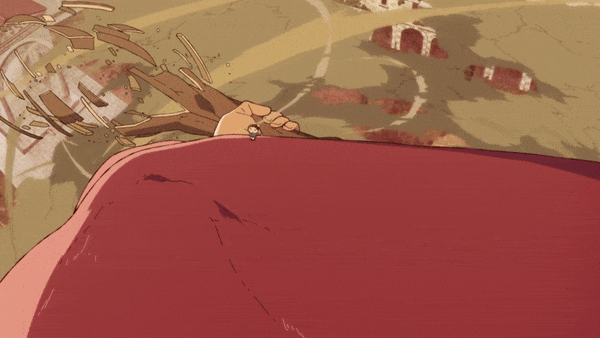
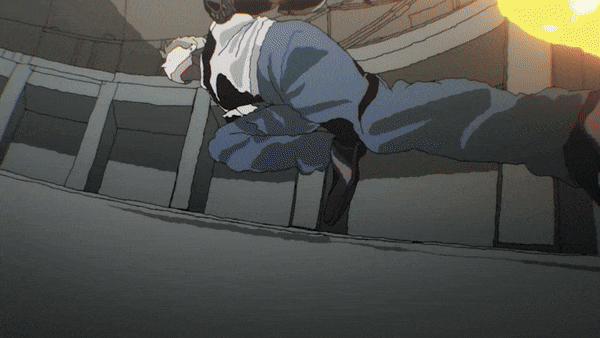
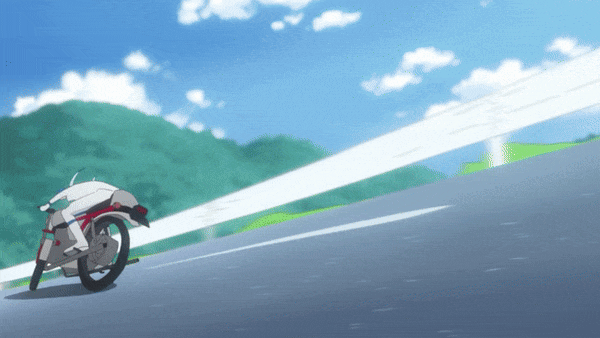
By animating the backgrounds rather than using painted still images, Ooshima and the team of other similarly skilled animators are able to create these beautiful dynamic camera movements that wouldn't be possible otherwise. Like these cuts by Takeshi Maenami where the camera becomes an expressive part of the scene, zipping forward and backward, and tilting to emphasize the speed of this murderous hermit crab. (Maenami's style is also very recognizable here - snappy timing and quick camera movements)


Or this cut by the incredible Kaito Tomioka which cleverly combines a traditional background for the walls with a fully animated floor. The level of detail in these tiles is just completely insane, and used to great effect with this wide, diagonal angle, and the way the camera tentatively drifts forward before reversing direction, and the tiles blur out as it speeds up.

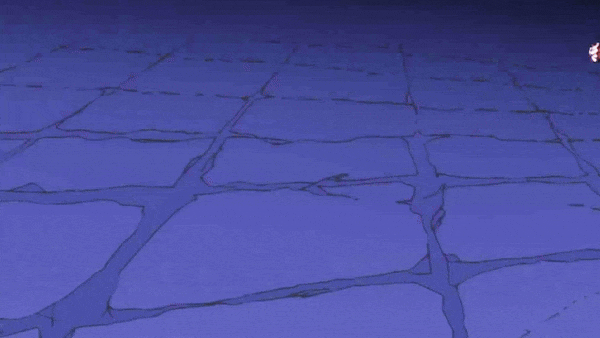
I don't think I'm the only one caught off guard by how much they full-assed this little side story, but it was a pleasant surprise!
I broke down the entire episode in this video here. A lot of research went into this one, and I think it's the best one of these videos I've made so far, so if you're at all interested in more of this type of analysis in video form, I would really appreciate it if you checked it out, or re-blogged this post! Thanks
youtube
[1] It's listed as Hirotoshi on Anime News Network, but Hiroaki on a key frame that Studio Trigger shared on Twitter, so I'm not sure which one is wrong.
#dungeon meshi#animation analysis#studio trigger#laios touden#chilchuck#video#original#mini essay#Youtube
16K notes
·
View notes
Text
The more I think about it, the more Laios and Falin's different perceptions of their parents are a case of "same parents, different childhood".
Whenever someone asks Laios about his and Falin's family, he comments on how they treated Falin but never comments about how how their childhood affected him - in fact, he kind of glosses over it. It's Falin that everyone is rallying to save, it's Falin that's Marcille's friend, it's Falin that everyone has a positive opinion of - he's just the weirdo brother that gets to share some of her light sometimes. He's the one who's only tolerated when he's useful in a dungeon. Falin's treatment is a large part of the reason that he left, but it's the symptom of a larger issue.
When we see Laios' thoughts of his parents in his nightmares, it's all about the expectations that he's supposed to live up to: the expectation to stop being "childish", the expectation to get married (to who his parents picked) and have children, the expectation to take over from his father as the village chief, the expectation to adapt to something that he isn't able to be in the way that people want him to. And these are all things that he has had to be told in some way: he had to be told that Shuro didn't like him, he had to be told that told that the gold-peelers were taking advantage of him - these aren't thoughts that just appeared on their own, these are all failures that someone has explicitly pointed out to him and they haunt him. Some of the things he considers his biggest failures are his failure to provide for and protect Falin and those have very tangible examples he can point to.
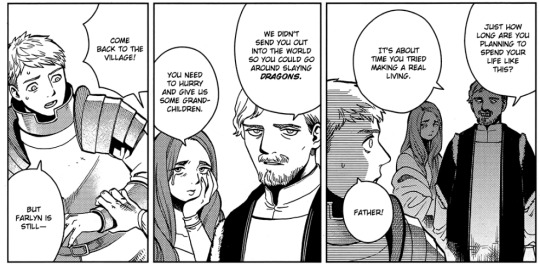
We get a glimpse of what happens when he fails to live up to his father's expectations when Falin is born. He expects a certain reaction from Laios and when he fails to give that reaction he physically puts him down, dismisses him, and underestimates how much he understands.
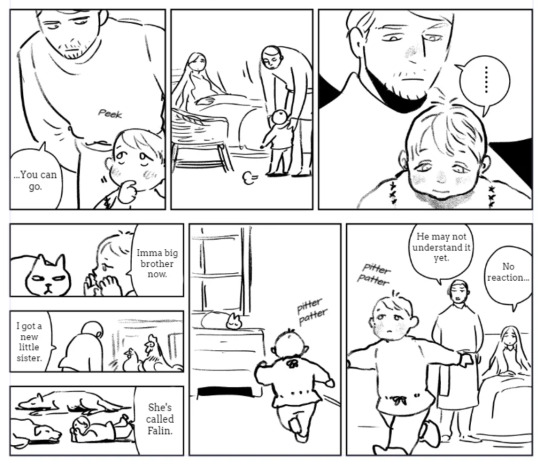
And that's something that's shown to be a bit of a sore point for him - people thinking that he doesn't understand something because he doesn't express himself like people expect. The few times we see him snap at people are because people think he isn't understanding something because he isn't reacting "normally".
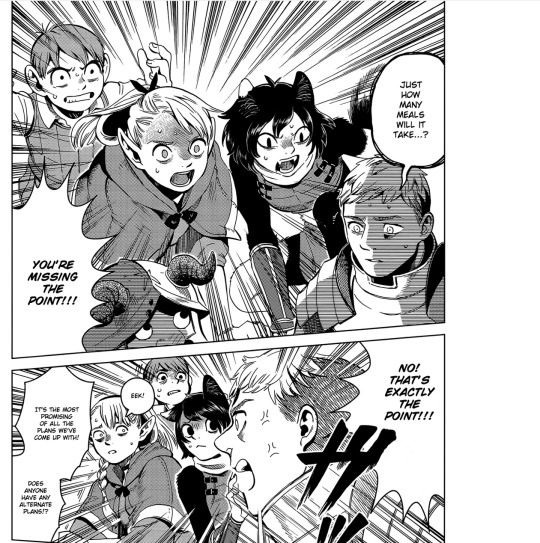
On Falin's side, the expectations seem to be a lot different - she's the younger one, for one, she's a girl, and she was so young when the fallout from her having magic happened. She too had an arranged engagement, but that was broken off when she was sent away to magic school and since then, their parents only seem to be passively involved in her life. She's mostly been freed of the expectations that their parents had for her in her village - she won't be coming back after all. She understands why they sent her away, she wasn't completely oblivious to the villagers treatment of her and it was, arguably, for the best so she is at peace with what their relationship is for now. But she still wants to go to her hometown and see for herself with adult eyes because she has never really had the space to do that.
I don't think their parents are inherently evil people - the truth is probably somewhere between Laios and Falin's version of the story, Laios' side tinged by too much cynicism and Falin's by too much naivete.
It just strikes me that when he tried to provide the "normal" way he failed, but given the space to do something similar to what people expected of him, but in his own way, he succeeded. He isn't perfect but his efforts are ultimately fruitful and he is able to carve out a place for himself, Falin, and others who had been ostracized like them to call home.
#dungeon meshi#dungeon meshi spoilers#dunmeshi analysis#laios touden#falin touden#i have a lot of touden feelings#i'm not letting mama and papa touden off the hook that easy#dunmeshi spoilers
6K notes
·
View notes
Text
seeing this part is what actually convinced me that ryoko kui knew about autism and wrote the siblings like that on purpose

i struggled finding way to explain why until now
as you can see ever since he was a kid Laios was especially sensitive to other people's expectations, which stresses him out. but Falin herself didn't seem to notice.
yet as adults we see that they grow up to be seemingly opposite of who they were as kids. as per his relationship with Shuro we could see that Laios didn't notice Shuro's distaste against him at all until he was told and with Falin she pays special attention to people and takes care of them to the point that becomes her most memorable trait to her teammates.
honestly it's the kind of progression that i've seen a lot among autistic adults. for laios i usually see it among people who finally found a comfortable space to be themselves and be immersed in their special interest. the happiness can get you kinda tunnel-visioned.
while with falin i feel like she's similar to me where we realized that the things other people usually notice easily doesn't come naturally at us so we end up compensating by working hard at being considerate to our friends but ends up being able to notice little tells others don't usually see
sometimes it's not even two different people, sometimes it's the same autistic person going through all of that
7K notes
·
View notes
Text
One thing I adore about the dungeon meshi kelpie arc is how it delineates the difference between “trained” and “tame” SO WELL. Anne the kelpie was nice around senshi, because he fed her and was always respectful. She was trained to not attack him, effectively. But she’s still a monster/wild animal, so the moment he showed “weakness” by trying to ride her, her instincts kicked in and she attacked. And. You’d think Laois, the resident animal lover, would be upset about having to kill a seemingly tame monster. But he suggests it first. He’s not just an animal lover, he’s a biology nerd, SO HE KNOWS ITS UNSAFE TO BE SO BUDDY BUDDY WITH A CARNIVOROUS WILD ANIMAL!
2K notes
·
View notes
Text
Evidence that Kabru from Delicious in Dungeon is Indian, a Masterpost
(Some of this info is taken from my upcoming essay about the names and cultural origins of all the characters in Dungeon Meshi. There's a link in the source to the AO3 version of this essay.)
Since Kabru’s first appearance in the anime is upon us, I wanted to write something that compiles all the evidence we have that Kabru is meant to be a person of South or Central Asian ethnicity, or at least whatever the equivalent to that is in the Dungeon Meshi world.
Ryoko Kui can and does draw people of many different ethnicities, and the way she draws Kabru matches the way she draws other Asian characters in Dungeon Meshi. He doesn’t look Black, or Hispanic, or any other ethnicity because he isn’t supposed to. He looks like a dark-skinned South or Central Asian person, because that’s what Ryoko Kui probably intends him to be.
So let’s go through the evidence!
(There are no spoilers for the plot of Dungeon Meshi below, but there ARE spoilers for Kabru's backstory as explained in the manga, and in extra materials like the Daydream Hour and Adventurer's Guide book.)
KABRU’S NAME
The Dungeon Meshi Adventurer's Bible tells us Kabru’s real name is unknown. There are other characters whose real names are only told to us in the Adventurer's Bible and were never revealed in the manga, but then Kabru, Thistle and Izutsumi’s entries simply say their real names are unknown, and though Kui could tell us their true names, she doesn’t. I assume this means that the characters themselves don’t know what their real names are, and that the names they go by are not their birth names, but this is only a supposition on my part.
KABRU THE MOUNTAIN
Kabru (काब्रु) is the name of a mountain on the border of Nepal and India, and part of the Himalayan range. It’s the 65th tallest mountain in the world and it is very snowy and icy, with frequent avalanches. Because of this, even though it’s not the tallest mountain in the world, climbing it is challenging, and is not often attempted. Those few that have managed to climb it consider it a major achievement.
“This prohibitively fearful icefall… had thwarted numerous expeditions, perhaps even the 'thought' of attempting the mountain… Unstable seracs of the icefall, a complex maze of chasms, and delicate snow bridges spanning seemingly never ending, near bottomless crevasses… Each time the members stepped into the icefall, they stood a good chance of never returning.” (Kabru - Mountain of the Gods, Major A. Abbey, Himalayan Journal 52, 1996, editor Harish Kapadia)
WHAT DOES KABRU’S NAME MEAN?
Kabru is a character that is known for being very good at charming people, but who doesn’t express himself honestly, because he’s trying to manipulate the people and situations around him in order to maintain control at all times. I think nobody really knows who Kabru is deep inside, maybe not even Kabru himself, so a remote, hostile, icy mountain that’s hard to climb seems like an extremely appropriate name.
Some of the oldest English sources I found regarding Kabru suggest that Kabru isn’t the correct local name for the mountain (a common problem in early Himalayan exploration by Europeans) and might just be a descriptor, or that it’s a misspelling.
This makes the name seem even more appropriate, since Kui’s told us Kabru’s true name is unknown. It’s possible that Kabru was a place-name or a descriptor that Milsiril (Kabru’s elven foster mother) was given when she picked up a traumatized 7 year old Kabru, and she just started using it as his name, and that even he doesn’t remember his real name thanks to his severe trauma.
The fact that people in the real world can’t seem to agree on the mountain Kabru’s name, or what it means, reminds me of the running gag of Laios repeatedly getting Kabru’s name wrong in the manga.
"All the people near the Kabru massif call it 'Kaboor'." (The Alpine Journal, 1921-22 Volume 34, Edited by George Yeld and J. P. Farrar)
“It is also said that the name applies to a peak close to Kinchinjunga on the southeast, and not to the peak known to Europeans as Kabru… [The real name is] Pahung Ri [Pauhunri].” (Appendix I: Place Names in Darjeeling. The appendix says it was “compiled mainly from an article written by Colonel Waddell and published in the Journal of the Asiatic Society of Bengal (Vol. LX, part I, 1891)”)
“Kangchen is a Tibetan name… the Sikkhimese use it as the name for the peak called Kabru by Europeans.” (Charles Bell, Dyhrenfurth's Himalaya (Berlin, 1931))
“...Kyabru or the horn of protection. The name is… Kabur… possibly a corruption of Kangbur or the swelling of snow; it might also mean the white swelling (kar-bur).” (Appendix I: Place Names in Darjeeling.)
“Kabru literally means the 'White Avalanche' peak (Ka means 'white' and bru means 'avalanche').” (Kabru - Mountain of the Gods, Major A. Abbey, Himalayan Journal 52, 1996, editor Harish Kapadia)
I’ve seen one other mountaineering article cite the “white avalanche” meaning, and I think it’s plausible since the Appendix says it can mean “white swelling” or “swelling of snow”, which may very well be a literal translation for “white avalanche”.
WHAT ABOUT UTAYA? IS THAT INDIAN TOO?
Utaya means “raised” or “uplifted” in Hindi, but it’s also a real village and a Japanese boy’s name.
Utaya (ウタヤ) is the name of the village that Kabru was raised in before his mother died and he was adopted by the elf Milsiril. Utaya is located in the southeast of the Western Continent. It’s worth noting that Kabru probably wasn’t born in Utaya, since his mother had to flee from her home to keep Kabru alive, so Utaya may be some distance away from his birth place… Not so far that a woman with a newborn baby couldn’t survive the trip, but far enough that her husband’s family gave up on chasing her. So Kabru was probably born in a close-by area.
In the real world, Utaya (Yakut: Утайа) is in an extremely rural and isolated area with a population of less than a hundred people. It’s located in the Sakha Republic, which is in the Northeastern part of Asia in the Russian Federation. The Yakut/Sakha are a Siberian Turkic people.
The Turkic peoples are a collection of diverse ethnic groups of West, Central, East, and North Asia as well as parts of Europe, who speak Turkic languages.
Early and medieval Turkic groups exhibited a wide range of both East Asian and West-Eurasian physical appearances and genetic origins, in part through long-term contact with neighboring peoples such as Iranian, Mongolic, Tocharian, Uralic/Yeniseian peoples, and others. Turkic peoples share, to varying degrees, non-linguistic characteristics like cultural traits, ancestry from a common gene pool, and historical experiences.
JAPANESE MEANINGS FOR UTAYA
Utaya can be a Japanese boy’s name with several different meanings, depending on which kanji it’s spelled with.
In most of the spellings: Poetry, sing a poem, singing, compose poetry
In many of the spellings: The place where the sun shines, it's been a long time, distant, big, to shoot with a bow, to swear, affirmation, question.
The Utaya disaster happened a long time ago.
If Utaya is up in the mountains above the clouds it’s a place where the sun shines brightly.
Kabru has sworn to himself that he will prevent another Utaya tragedy from happening.
In only a few of the spellings: to mend, feathers, wings, a word for counting birds and rabbits, sort them out, washing with water to separate the good from the bad, roof, house with a roof, a world covered with a big sky, infinite space, song that praises the Buddha, Eight.
Counting birds and rabbits makes me think of divination and also that the people of Utaya were like little birds and rabbits (small prey animals) to the monsters that devoured them.
Separating the good and the bad could hint to the “judgment” of Utaya and the greed of its people that led to their downfall, also sorting through things to separate good and bad is something that’s done with food and other resources.
The Himalayan region is often referred to as the “roof of the world”, with a big open sky above it.
The infinite could refer to the dimension the demon comes from, or to the sky above the mountains.
Buddhism is a common religion in the Himalayan region, and eight has auspicious connotations in Buddhism.
With all that in mind, Utaya as a name for Kabru’s home village is an interesting choice, and adds another layer to his origins, maybe suggesting not just North Indian/Himalayan, but Central or North Asian cultural influence as well.
It is also possible that the name is just telling us that Utaya is “up” in the mountains, or that it was “uplifted” by the wealth of the dungeon, or even that Kabru was “raised” there… The Japanese name meanings are also extremely fascinating and hint at similar ideas, as well as the tragedy that happened to Utaya.
WHY ELSE DO YOU THINK KABRU AND UTAYA ARE HIMALAYAN?
In the real world, the Himalayan mountain range is an extremely popular tourist destination, and the amount of people who want to visit and attempt to climb the mountains far outpaces the local ability to support it. This makes me think of the dungeon of Utaya and how people overcrowded it in their desire to conquer and exploit it.
Dungeons as an unsustainable way for locals to make a living that leads to the destruction of their homes when the dungeon inevitably collapses is a major plot point in Dungeon Meshi, so I think the parallel is likely intentional. Characters often talk about someone “conquering” the dungeon, and “conquer” is also the terminology commonly used for climbing a mountain. This terminology obviously has a hostile, imperialist subtext in the real world, since it’s most commonly used by outsiders talking about proving their strength by climbing a mountain.
Also, there are local legends in the areas surrounding Mt. Kabru that there is a valley of immortality hidden on its slopes, which reminds me of the way that the dungeons can grant conditional immortality to the people inside of them.
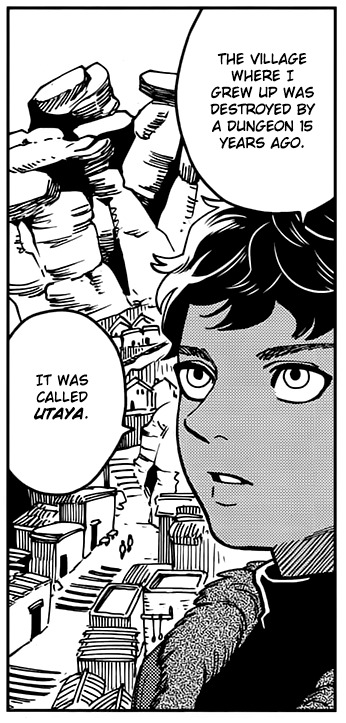
This image of Utaya could be showing us a village built on a mountainside. The house shapes seem a bit more Middle Eastern than Nepali/Indian, but it’s not a detailed drawing and the roof styles are a mix of flat and peaked.
CULTURE
In the Daydream Hour sketchbook, Ryoko Kui included a small comic about characters sharing desserts from their home countries. A young Kabru is shown enthusiastically trying to share an unnamed sweet, and he is interrupted by his elven foster mother, who insists he present a type of elven cake instead. We know that Kabru hates this type of cake, and he seems disappointed to have to eat it and talk about it.
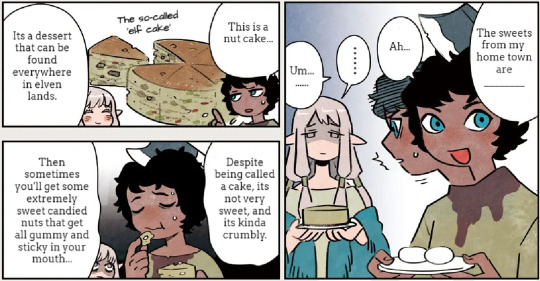
The white balls in Kabru’s dessert are very likely meant to be an Indian sweet called rasgulla (literally "syrup filled ball"). Rasgulla are a dessert popular in the eastern part of South Asia, made from ball-shaped dumplings of chhena dough, cooked in light sugar syrup. While it is near-universally agreed upon that the dessert originated in the eastern Indian subcontinent, the exact origin is disputed. Rasgulla are as culturally important to the Bengal and Odisha regions of India as Parmesan cheese is to the region of Parma in Italy.
Rasgulla are also popular in Nepal, where they are called rasbari.
KABRU’S PHYSICAL APPEARANCE

Kabru is one of several characters in Dungeon Meshi with clearly non-European features: he has brown skin and thick black/dark brown curly hair. He has almond-shaped eyes with long, dark lashes (fans like to joke that he’s wearing eyeliner). All of these are traits common to people from the Indian subcontinent. His blue eyes are not common for someone with his skin/hair color, but blue or green eyes are not unheard of in that region either.
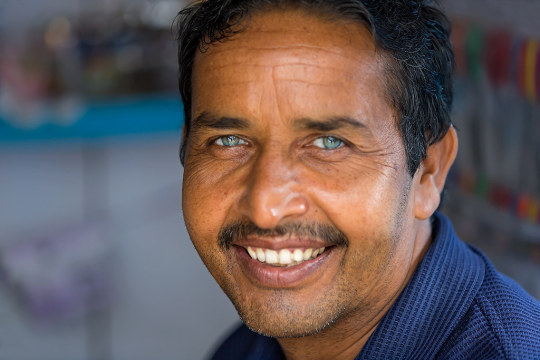
(Indian man with blue eyes)
Blue or light eyes are often a cause for discrimination, like what Kabru experienced as a child. More on this in a moment.
Kabru is 5’7” (170cm) tall, which is short for a Northern European man (180), tall for a Nepali man (162cm), but close to the average height of Indian men (177cm). He has a slender build, which is also common for Asian people in general, and South Asian men in particular.

Compared to the European-looking tall-men in Dungeon Meshi (such as Laios, Falin, Delgal, Marcille’s father), Kabru’s facial features look more like the other Asian characters, such as Toshiro and his party.
CAN DARK-SKINNED PEOPLE HAVE BLUE EYES?
Yes. Light-colored eyes are very uncommon in parts of the world where most people have dark eyes, since dark eyes are a dominant trait in real-world human beings. That means that in order for two parents with dark eyes to have a child with light eyes, both parents need to have a recessive light-eyes gene (or for there to be an illness or genetic mutation), and that’s rare in populations that don’t have a lot of light-eyed people to begin with.
THEN WHY DO SO MANY DARK-SKINNED CHARACTERS HAVE BLUE EYES?
Anime and manga often give characters with dark skin light colored eyes instead of allowing them to have brown or black eyes, which is much more common in real life. It’s a hurtful design trope that makes many readers feel that their natural dark eyes are somehow ugly or inferior to blue eyes.
This trope is used over and over again by authors who want their characters to look “cool” and “exotic”, and for their eyes to be high-contrast to make it easier to show their emotions.
I don’t think this is what Ryoko Kui is doing in Dungeon Meshi.
UNREALISTIC HAIR AND EYE COLOR COMBOS IN ANIME
In a lot of anime/manga, blue eyes (regardless of skin color) don’t actually mean anything in the narrative, in the same way characters having green or pink hair doesn’t mean anything, the colors are non-diegetic, they don’t actually exist in the world, like the music that plays in the background without an on-screen source.
It’s an artistic shorthand to make characters visually stand out, instead of giving them all black hair and eyes like most real-life Japanese people… Which is what most anime/manga characters are meant to be: Japanese people.
Dungeon Meshi has a large cast of characters that are explicitly meant to be non-Japanese. We know this because there’s a group of characters that are Japanese, and they’re drawn differently from everyone else, they wear ethnically Japanese clothing, and have ethnically Japanese names.
Unlike other series, where eye and hair color don’t mean anything, Dungeon Meshi has no unrealistic skin, hair, or eye color combinations.
(Except for the elves, who seem to have different genetics than real world-humans. I’ll get into that another time.)
Ryoko Kui must be aware of the dark skin, blue-eyes design trope, because if she gave Kabru blue eyes just because she thought it looked good, surely she would have made some of the other Asian or dark-skinned characters have light eyes. Out of 9 Asian or dark-skinned tall-man characters, Kabru is the only one with blue eyes.
Kabru having light-colored eyes is central to his story, and Kui talks about it.
KABRU’S STORY AND WHY HIS BLUE EYES MATTER
Kabru’s father and his family tried to kill Kabru when he was born because he had blue eyes. Kabru’s mother ran away, and ended up raising Kabru by herself in Utaya. She didn’t try to return home to her own birth family, but instead struggled to raise a child completely on her own with no money or support, which implies she had no other options, due to the fear people of their region have for people with blue eyes.
This is a real thing that used to happen frequently in areas where most of the population has dark eyes, and it still happens to this day.
In a realistic story, this is logically what would happen to a character with dark skin born with blue eyes in a place like the Utaya region. It’s rare for manga or anime to show dark-skinned blue-eyed characters facing this.
WHAT IS THE “EVIL EYE”?
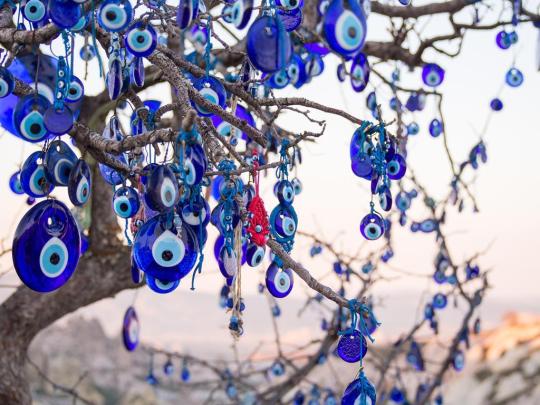
The “evil eye” is a supernatural belief in a curse brought about by a person looking at you. The belief in the evil eye has existed since prehistory, as long as 5,000 years ago. It is estimated that around 40% of the modern world's population believes in the evil eye. This concept is most common across the Mediterranean, the Balkans, the Middle East, and Central and South Asia, areas where light-colored eyes are uncommon.
In areas where light-colored eyes are rare, people with green eyes, and especially blue eyes, are thought to bestow the curse, intentionally or unintentionally. Just one look from a blue-eyed person is often considered enough to inflict a curse.
One of the most famous and widespread talismans against the evil eye is the nazar, a glass amulet featuring concentric circles in dark blue, white, light blue and black. It’s supposed to “bounce” the curse away from the wearer.
HOW DOES THIS APPLY TO KABRU?
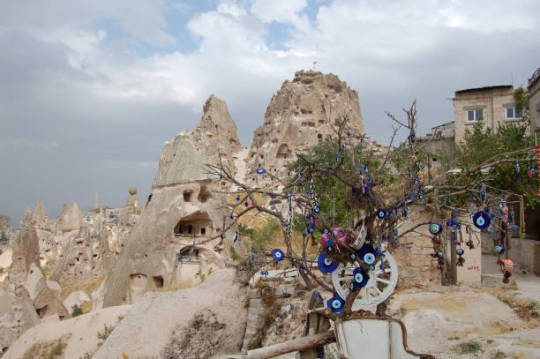
Imagine Kabru growing up in a village surrounded by people wearing and hanging talismans that look like his eyes, because the people around him think blue eyes are evil. They call his mother a witch for birthing him, and a whore because she doesn’t have a husband. Imagine parents forbidding their children from playing with or even talking to Kabru. People crossing the street to get away from him, or chasing him away by throwing rocks.
I think the reason young Kabru was able to learn how to speak some kobold is likely because he was so heavily ostracized by the other tall-men around him, the only children he could occasionally interact with in Utaya were kobolds, who might not share the same cultural superstitions that the tall-man do.
This childhood trauma, combined with Kabru’s experience of the dungeon collapse in Utaya, and being raised by an elf that treated him more like a pet than a human being, set Kabru up as a character who has never had a home where he belongs. He has been an outsider from the instant he was born, and every place he has lived treats him as an “other.”
To his father’s family, he was a curse. To his mother, although she loved him, he was a burden. To the people of Utaya, he was a monster. To the elves, he’s a tall-man baby (no matter how old he gets) with funny looking eyes, to the people on Merini Island, he’s a foreigner from the West with elven ways and education.
CONCLUSION
I wanted to write this because I know some people will see Kabru in the anime for the first time today and think "Oh, another dark skinned blue eyed character! This is a bad character design that is evidence that the author is racist at worst or ignorant at best.” And I don’t think that’s a fair assessment of Ryoko Kui’s work in Dungeon Meshi.
This isn’t to say that Ryoko Kui has never done anything wrong, or that her work couldn’t be more inclusive, or that there’s no way in which she could improve.
But there are pages and pages of artwork she’s done that shows she cares about these issues, and I think it’s worth celebrating when someone makes that kind of effort with their artwork.
ANYWAY…
If you’ve read this far, you’re very strong hahaha. I hope you enjoyed this essay. I’ll be publishing more soon when I finish my Dungeon Meshi research on the names and cultures of all the characters. Wish me luck!
1K notes
·
View notes
Text
youtube
Watch the American Climate Leadership Awards 2024 now: https://youtu.be/bWiW4Rp8vF0?feature=shared
The American Climate Leadership Awards 2024 broadcast recording is now available on ecoAmerica's YouTube channel for viewers to be inspired by active climate leaders. Watch to find out which finalist received the $50,000 grand prize! Hosted by Vanessa Hauc and featuring Bill McKibben and Katharine Hayhoe!
#ACLA24#ACLA24Leaders#youtube#youtube video#climate leaders#climate solutions#climate action#climate and environment#climate#climate change#climate and health#climate blog#climate justice#climate news#weather and climate#environmental news#environment#environmental awareness#environment and health#environmental#environmental issues#environmental justice#environment protection#environmental health#Youtube
6K notes
·
View notes
Text
World Map Notes: the Elven Northern & Southern Central Continents
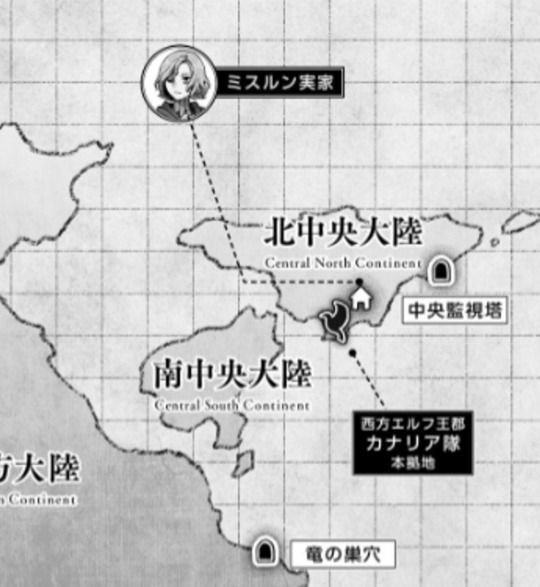
These nations are where all the elves in the story except Marcille and Thistle are from. This post collects all the information I could find about these two nations, and included a bit of analysis based on that information.
TL;DR (includes both fact and my speculation):
The Northern Central Continent is a feudal monarchy with a strong class system, as well as strict borders, & could probably be considered an ethnostate. It's deeply hierarchical, and the queen is a traditionalist - so it's probably very structurally biased against non-elves and half-elves.
Elves in the NCC practice cannibalism in some rural areas!
The Southern Central Continent is more diverse, with a large tallman population on its South Coast.
To elves, "Court Magicians" exclusively refer to those serving the elven queen - a prestigious role that seems likely to be only open to nobles.
The SCC may not be a monarchy, though it's not clear what kind of leadership or societal structure it does have.
The NCC will habitually take anyone involved in ancient magic as a criminal to prosecute on their terms, regardless of jurisdiction, but this depends on their political influence and ability to pressure local leaders to agree to extradite the criminal.
Elves VS Dwarves and Gnomes may have been at war around the time of the Golden Kingdom being sealed. This conflict also may be one of the factors pushing the kingdom to be sealed in the first place.
The "Central Region" might be the origin of the "Common Tongue" that our characters speak.
Northern Central Continent
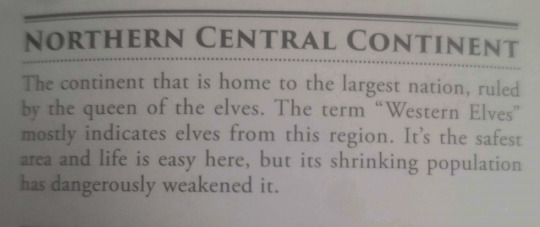
The Adventurer's Bible | p. 132
For this place to have a high quality of life, and also a declining population - especially when it's so close to the Western Continent, which is stated to have poor quality of life - there must be strictly maintained borders and a strong anti-immigration policy. Based on the attitude of the elves, I wouldn't be surprised if it was very difficult to move there unless you are also an elf.
It could probably be considered an ethnostate - and while in these kinds of fantasy worlds, that's pretty common. Take Rivendell, or Moria, in LOTR - they take for granted that these kinds of different fantasy races will live in separate communities.
But that isn't actually realistic, and I think Kui has considered it as more of a politically established status quo rather than an obvious natural result of having magically distinct "races". Which, even in Dunmeshi, I think is a difficult and not-terribly-accurate way to represent politics - racism does not emerge from actual, physical differences between races, after all.
But Dunmeshi's presentation of this idea is interesting, because of the recognition that if there is an "elven nation" which prioritises the interests and rights of elves over other races, that is because there's a deliberate, concerted effort to keep it that way.
But there's a small section of the NCC with a high tallman population - I wonder what kind of community they have, and how they fit into the strict elven hierarchy?
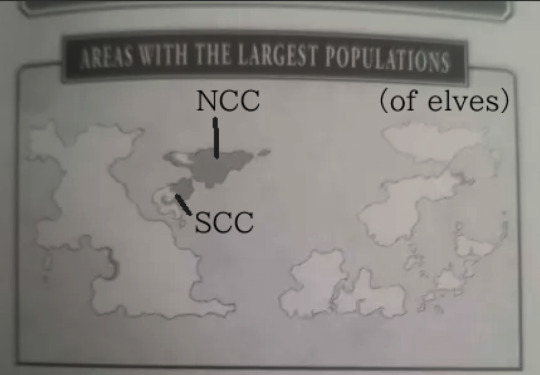

The Adventurer's Bible | pp. 134 & 136
Kabru and Rin, and other kids like them, who are adopted or taken as adopted children(rarely - the way Milsiril treats Kabru is not perfect, but she's deliberately attempting to be better than other elves.... meaning other elves are usually worse)/pets/objects by elven nobles, as well as accomplished or notable individuals who earn the elves' favour/are "invited" to stay (such as they try with Laios at the end of the story) would be an exception.
Other long-lived races could probably (...?) visit, but given the historical conflict between elves, dwarves, and gnomes, I think they'd also be pretty hostile to many of them coming to live on the NCC, even if they see them as more like equals.
Social Structure & Nobility
The Northern Central Continent is an absolute monarchy under a 372 year old queen, Heimeya (IDK what the official romanisation of her name will be).
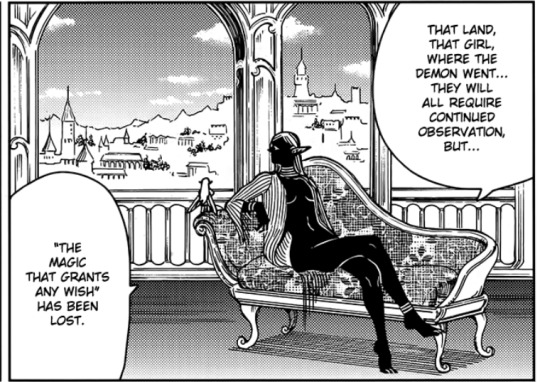
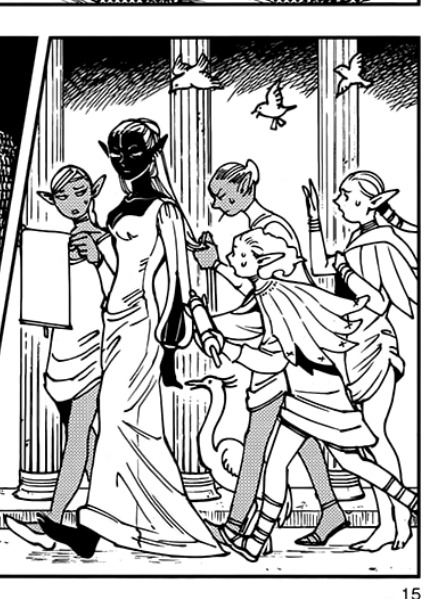
...With extended "nobility", which are the group that the canaries' guards draw from. We don't get much clarification of what sort of structure their nobility has, what titles there are, and where our characters who are nobles fall into it.
Pattadol (House of Vari), Mithrun (House of Kerensil), and Milsiril (House of Tol) are nobles.
Mithrun's noble house, Kerensil, is apparently a well-known family of investors! I wonder what sorts of businesses they invest in & what the elven economy is like?
Milsiril's house, on the other hand, is a well-known military family. I wonder if Kabru could claim the surname "of the House of Tol". He did go to family gatherings after all. But if he was comfortable doing so and it would be accepted, I would assume he'd have done so when introducing himself to the canaries.
Flamela is a distant relative of the queen, who has additional status due to exhibiting the genetic trait associated with their queens, extremely dark skin.
The queen is a "staunch traditionalist" who wouldn't even acknowledge a half-elf like Marcille. Nice! I really feel bad for Kabru and Rin growing up as tallmen in this sort of culture.
Court Magicians
While generally this is a term for any magic user who serves in a royal court, in the Northern Central Continent it seems to carry a lot of esteem; even just as the daughter of one, Pattadol assumes Marcille has the right to boss her around and to handle highly secret, highly illegal ancient magic secrets.
That makes sense, as in the society of the Northern Central Continent, you'd be directly serving the elven queen. But also, she has enough Court Magicians that Pattadol would not expect to know Marcille's mother's name, but few enough that it would be a big deal and Cithis would know about it if one had a half-elf child.
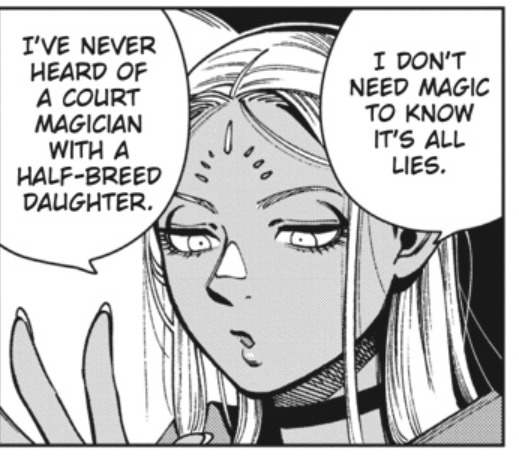
I don't think it's remotely unlikely based on that to assume that this role is only available to nobles.
A "Court Magician" who doesn't serve the NCC Queen isn't a "real" Court Magician in the eyes of NCC elves. Those short-lived monarchs would be happy just to have an elf around regardless of whether they were actually any good at magic.... according to Cithis.
Magic seems very important to the society of the NCC elves. The queen communicates with her subordinates via familar, and the birds we see surrounding her seem like they are some kind of magic - perhaps not familiars since we see her familiar, but some other kind of scrying?
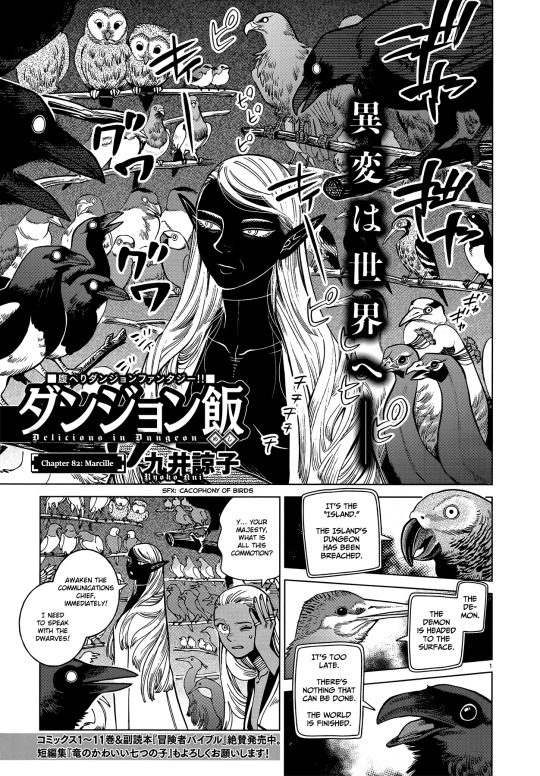
Also, based on the fact Pattadol assumes a Court Magician would be serving the Queen of the NCC, we can theorise that perhaps whatever structure the SCC has, it isn't a monarchy....? Heimeya is "the queen of the elves", after all - that doesn't sound like there's another elven monarch competing for the title just next door.
Ordinary People
Apparently the NCC is a safe place and life is easy -- but given the strict class system, I kind of expect that varies a lot depending on the family you're born into.
The only elves we meet who are not nobles are the convicted criminal canaries, so it's hard to get a sense of what life is like for them from that. Cithis was apparently a wealthy fortune teller with "an intense jealousy for those born noble or wealthy." So I assume she was not born into comfort.
Apparently "There are also primitive villages deep in the woods and underground, and in some regions cannibalism is still practiced." Which is awesome. Based on her videogame elves art I think Kui's probably making a little nod to Divinity: Original Sin elves, who can absorb memories through eating the flesh of others. Elves in dungeon meshi don't have this trait, but I wonder if there is a magical ritual or some kind of cultural practice with a similar intention.
Cuisine
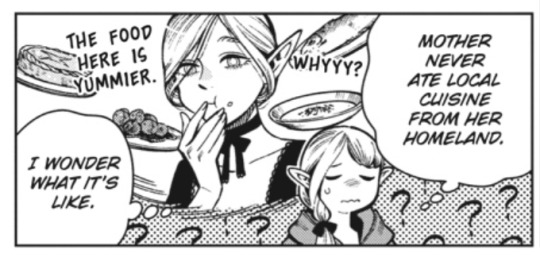
Marcille's mother didn't think much of the elven cuisine.
Liricmumwarel is fancy candy given out by the elven queen the shape of which conveys blessings.
Elf Cake is a crumbly dry cake that Kabru and Thistle don't think much of. I've heard someone discuss what it's likely to be made of, but I am afraid I don't recall.
Southern Central Continent
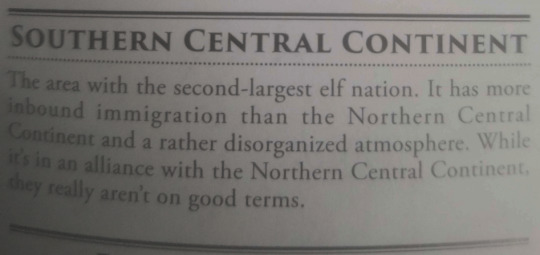
The Adventurer's Bible | p. 132
It seems like the Southern Central Continent gets a lot more immigration and has a more diverse population, especially along the south coast (near the Western Continent). That south coast has a high tallman population.
Fleki and Lycion are from the Southern Central Continent. Fleki got into ancient magic for the money, so you can assume there's probably class disparity there too; things are noted by Kui to be more "disorganised" than the NCC. Not a bad thing at all - the NCC is definitely too "organised" in my books. But that does potentially also mean there's less, e.g., bureaucracy, central organisation, less of a social safety net. But then again, in the NCC I doubt that whatever "safety net" there is, is available to everyone.
We can't extrapolate much from Fleki & Lycion's personalities, because they clearly aren't in the most stable societal position, and I get the sense that they're the countercultural type - they probably don't represent the type of person typical to the SCC. Also, our NCC characters are all either nobles or used to navigating high society (Cithis, Kabru to an extent) so they aren't exactly a typical "ordinary NCC person" as a basis for comparison either. However, there's less of a "strict set of social rules" type of feel to the SCC characters, fitting with my suggestion that the SCC may not be a society with a strong feudal element.
Geopolitics & Conflict
The fact that, despite their being from the SCC, Fleki and Lycion are in the Canaries, who work directly under the NCC's Queen, implies that the the NCC feel entitled to process and prosecute people who commit ancient magic-related crimes regardless of any notion of "jurisdiction". This is backed up by the way that they were going to take Marcille - but that is something that the governor of the Island had to give permission for, which Laios is able to withdraw. So I assume that the NCC elves apply pressure on various world leaders to extradite criminals involved in ancient magic.
The SCC would cooperate with this, since they're allies, even if they don't have a great relationship (according to the World Guide).
The NCC are also clearly able to take half-foots without trouble, as we see by Chilchuck saying he's known half-foots who got involved with "black magic" (ancient magic) and were disappeared by the elves. But I doubt gnomes or dwarves are giving people up easily - though that probably doesn't go for dwarves like Senshi and Namari, without strong community ties.
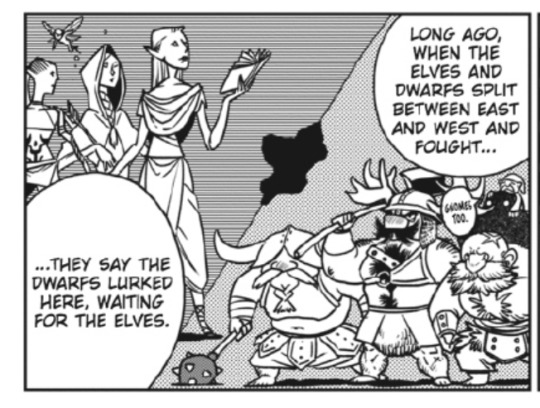
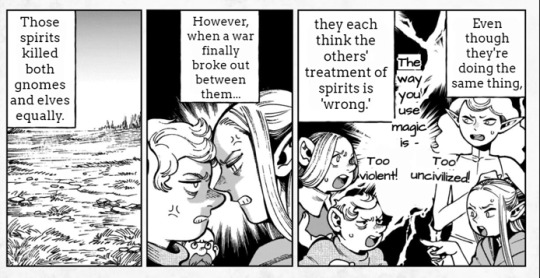
Long before the current times, elves fought dwarves & gnomes. There might have been more than one of these conflicts...? While long ago, this war isn't "ancient" (like the ancients who sealed the demon into dungeons, before their world was mostly destroyed by it).
Thistle, Delgal, and the Golden Kingdom were (I believe) caught up in one of these conflicts, which used Melini as a staging ground - thus why Thistle was pushed to seal the entire kingdom in the dungeon.
To do this, Thistle unseals a dungeon created by the "ancient people". These could be the "ancients" who created the dungeons, before the apocalypse. Or they could be another, still extinct, society.
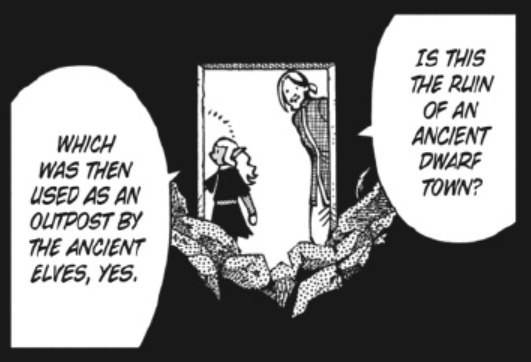
Regardless, at least one of these conflicts seems to have taken place after the golden kingdom was sealed - so, within the last 1000 years.
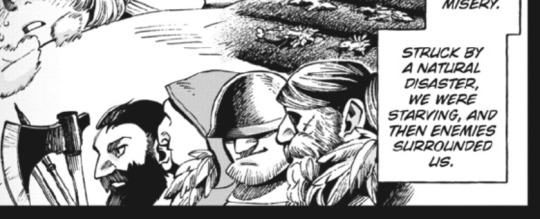
Though, this could refer to a different, more localised conflict between the Golden Kingdom and their dwarven neighbours.
The order of events is that the Golden Kingdom was sealed (1000 years ago or so) > Dwarves took over > Elves stole the land from the Dwarves ("long ago" by the Island Lord, a tallman's, standards) > Elves gave the land to a local lord, who was either an ancestor of the Island Lord, or the Island Lord himself. The Island Lord is himself a descendant of the lord who poisoned Delgal's father, as is noted in the World Guide. However, it isn't impossible for there to be large gaps of time between these events, which could put the elf / dwarf wars at a more recent date.
The fact we know that the elves stole the land from the dwarves, and then granted it to a political actor who was relevant during the events of the Golden Kingdom flashbacks we see suggests to me that the events were roughly contemporaneous. If they were, that puts at least one of these conflicts at roughly 1000 years ago.
So, the elf/dwarf & gnome conflict is "long ago" by short-lived standards, but would be considered "modern" by the long-lived races, if you ask me. At least, the equivalent of the World Wars for us - recent history, even if we weren't alive.
I'm guessing the "Elf King" from the below panel in fact was a word that's more gender-neutral in Japanese, since the "Western Elves" definitely have a queen.
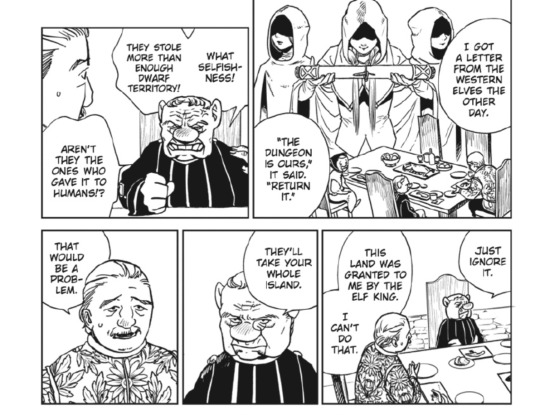
Language
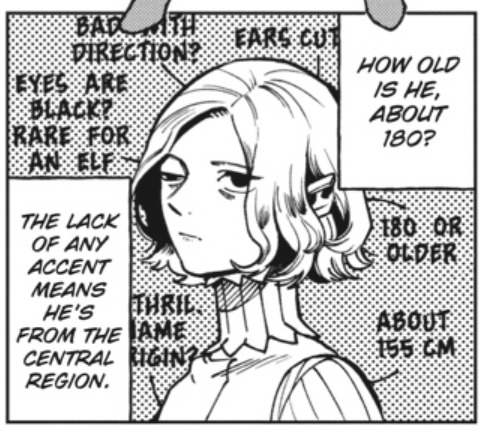
When Kabru says the "Central region" I expect he means the region where the NCC and SCC is.
The fact that he observes that the lack of any accent means he's from the Central Region is really interesting. It could mean two things;
either they switched to speaking in the language spoken on those continents, which Kabru would naturally know, having grown up there. It's 100 percent possible, but I think this would be noted in the story.
or, the language that gets called "the common tongue", the one that all our principle characters speak for most of the story, originated from the elves in the Central Continent. Or at least it's the same one that the elves use, and their political influence is great enough that their accent gets to be considered not an accent at all. The fact they were "granting" land in this area to tall-man lords suggests a large enough historical influence in the area that this is quite plausible to me.
Mithrun absolutely does have an accent - nobody speaks without an accent. His accent is just politically and socioculturally normalised to the point of being considered the "default/proper" way to speak - like received pronounciation in English.
The common tongue isn't ubiquitous everywhere - not just Kuro, but Kiki and Kaka are also noted to be studying the common tongue. The Tansus were born on the Eastern Continent, so probably gnome communities there speak their own language - Kiki and Kaka grew up primarily surrounded by gnomes after all.
It's also quite likely that Kabru, specifically, because of where he grew up, would consider Mithrun's way of talking to be the default "not an accent" accent. His adoptive mother surely has the same upper-class NCC accent. I expect that other characters might experience it as more "marked".
This isn't a world where everyone speaks the same language everywhere; the common tongue is called that, but there are many different languages. Kabru and Chilchuck are two characters who are adept with many of them - Kabru speaks the language of the kobold, and probably lots more. Chilchuck works as an interpreter as part of his union stuff - I can tell you from experience that that's a hugely valuable skillset in that context, as many of the people who most need union representation are people who don't speak the dominant language, or at least not fluently.
If you got all the way to the end of this post.... thank you for reading, I love you. Check out my other World Map Notes under that tag on my blog; I've made a few so far and there will almost certainly be more. Next I'm thinking the dwarven nations...? But I could be persuaded if someone had a preference.
Also, anyone got any speculation on what, exactly, is the previous time that Heimeya ate a person/monster/chimera that this panel implies:

We really don't have anything to go on whatsoever, but I think it's a fun tidbit.
#og post#dungeon meshi manga spoilers#dungeon meshi meta#dunmeshi#dungeon meshi analysis#delicious in dungeon spoilers#dunmeshi spoilers#delicious in dungeon#dunmeshi meta#the canaries#milsiril#mithrun#kabru of utaya#i feel sooooooo sane to have made this. but it has some super interesting details imo#colour coding only on the TLDR just cause I dont want ppl to take my theories as fact#character info I drop without a panel comes from the world bible#world map notes
162 notes
·
View notes
Text
Soooo I read all of Dungeon Meshi in this past week and I have many thoughts bouncing around in my brain and I think the only thing to do with them is some AGGRESSIVELY CLOSE READING of a scene I wanted to come back to and try to understand better.
So: I want to talk about chapter 28
This entire section of the story is something I feel like I am going to want to come back to a lot, because its such a transitional time and I feel like there are a lot of themes/ideas that I wasn't fully aware of during my first reading, and stuff I missed because of that.
One of the biggest things I have been turning over in my head is... hey, what was UP with the Marcille/Falin bath scene? Maybe it was because I was already primed to pay attention to stuff with them going into the story, or because I had already seen a couple of panels out of context. In any case, it really kind of stuck out to me as being very short but also VERY intense, while also being... hard for me to define? Some part of the nature of the intensity felt like it was going over my head.
I wasn't sure that revisiting it would help with this right away, but to my surprise, it actually WAS a lot easier for me to follow and understand when I went back to it. So I want to just do a close reading of That Scene and some other parts of the chapter & context around it all, because I think it offers insight into Falin & her relationships, and what purpose this chapter serves within the story as a whole.
So first of all, I think it's interesting that the scene starts with Marcille bathing Falin.
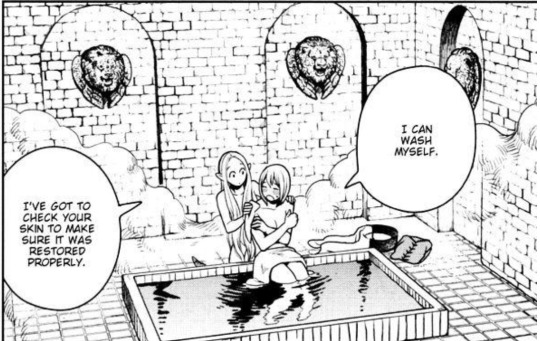
It feels very caring in a more platonic, less charged way then what will follow.
Marcille goes from this caretaker mode to joining Falin in the bath, and then of course we get the first of The Panels
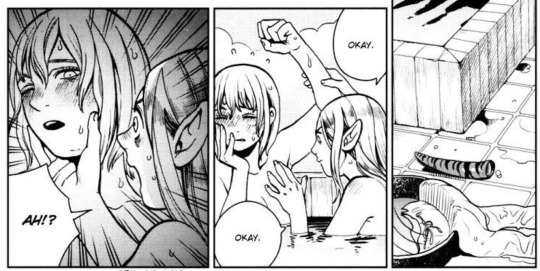
(as a small note, I only noticed when revisiting that Marcille is using the rest of her Kelpie soap in the bath. Isn't that just the most heartwrenching little detail. Augh)
Anyway, one of the first things I thought was interesting going back to this is how much it reminded me of the very different sort of intimacy that came just before it - when Laios and Marcille assembled Falin's bones.
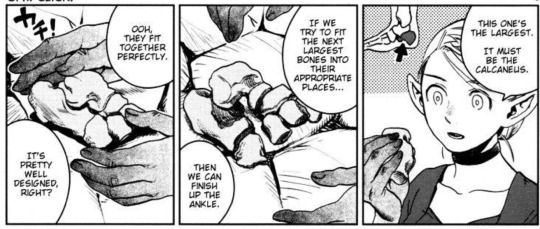
This is such a beautiful and intimate sequence, and something about Marcille examining Falin, whole, after the fact... I can't imagine there are not some echoes of those bones in Marcille's mind. The action seems more startling/intense for Falin at first, and maybe part of that is because Marcille has already experienced this level of intimacy with Falin's body in a way Falin herself wasn't a part of.
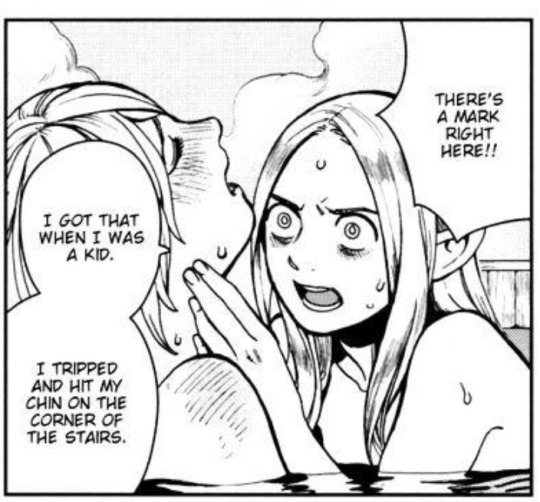
This panel in particular I think is a summation of the difference in the experience for them. This looks like... near orgasmic for Falin tbh, and Marcille is very focused on the actual like practical part of what she's doing, seemingly completely unaware of the Effect she is having on Falin.
The whole short sequence is focused on this intimacy that Marcille initiated seemingly without fully being aware of what she was actually doing. And once Marcille is satisfied, she is also the one that ends it, sitting back in the bath and moving out of Falin's proximity. All on her own terms, and for her own ends.
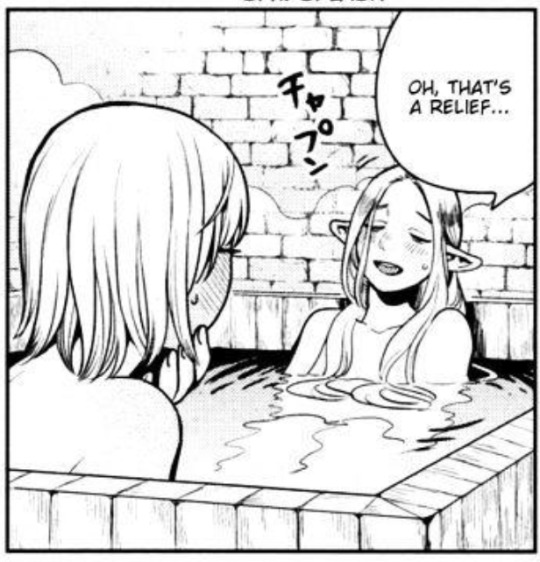
HOWEVER... Falin doesn't just let things go.
Instead, she returns Marcille's attention. First, by asking after her wellbeing:
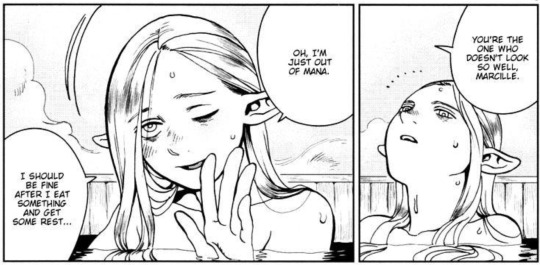
Marcille, of course, deflects (there will be a lot of that in this scene).
But Falin doesn't let it go.
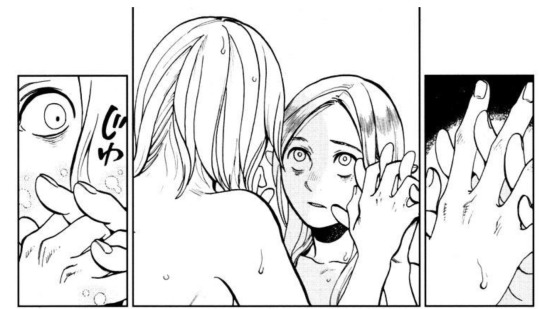
Falin is not a confrontational person. She likes to keep the peace. In this context, and in context of the way that Marcille was the one to come into Falin's space initially, the way that Marcille controlled the initial intimacy... this is striking. I genuinely think that these three panels might convey one of the most assertive actions Falin (as herself) takes in the entire story. One of the only things that outdoes it is the fucking INCITING INCIDENT OF THE WHOLE STORY.
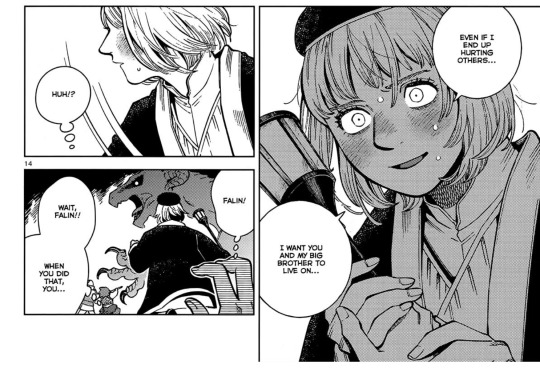
I'd also like to point out here that this action of Falin's also parallels her resurrection by Marcille & Laios. It's is also a forbidden magical action done to save someone(s) she loves, and its something she does TO them, that they are not fully aware/able to react to until its done.
Anyway, back to the bath scene. Falin is taking action here and asserting herself. And how does Marcille react?
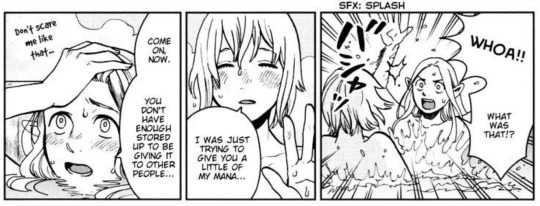
She flips out!! She rejects it! She tells Falin that she isn't supposed to be acting like that.
It's a very distancing response from Marcille, and also one that puts her back in that caretaker mode from the start of the scene. She also puts even more distance between herself and Falin by sinking into the water.
Falin doesn't give up though! She continues to assert herself. She's okay, she is allowed to chose to do this.
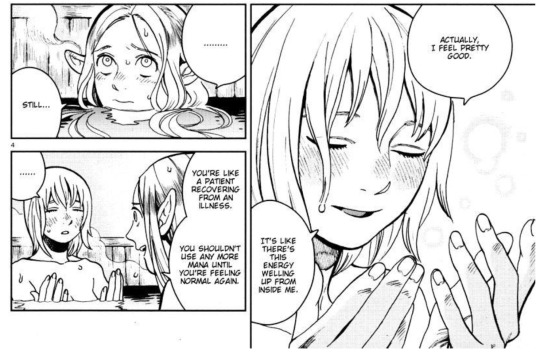
And Marcille continues to push her away. It looks to me like she only starts to relax a little once she fits Falin into a role she can better define and control. You're a patient, you're recovering, I understand this fact and you don't. Let me take care of you.
But, for a third time, Falin pushes back.

I don't think it’s coincidence that this is where she opens her eyes. She asks directly about the thing that they have both been dancing around:

The resurrection spell. The fact that Falin KNOWS about this, at least in part, recontextualizes the quiet battle for control between the two them. They both know at least some part of the truth. Marcille wants nothing else then to ignore it. Falin wants to be able to talk about it. Marcille's blatant refusal to give her those answers, I think, is what keeps them out of sync - intimate only ever in one direction at a time, never fully together.
And of course, even when directly confronted, Marcille refuses to engage with the truth.
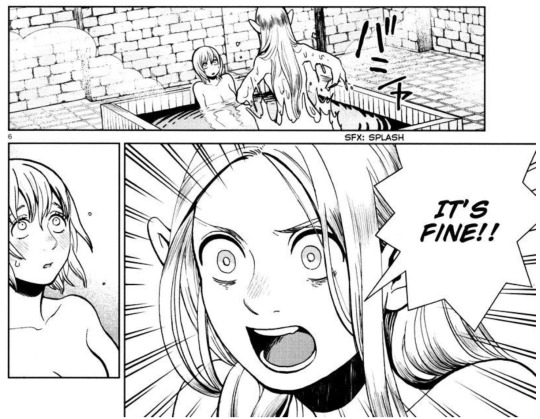
This moment being on the bottom of the page is notable too. There's a beat here. The last panel holds on Falin's face. The reader reaches the bottom of the page, and they are held here for a beat as well, with Falin. It's not quite a rejection yet. What Marcille says isn't directly an answer to Falin's question, but it is a response. A valid one, even! Falin wasn't just asking the question after all, but struggling with guilt that Marcille has every reason to want to reject.
But then you move on the next page, and...
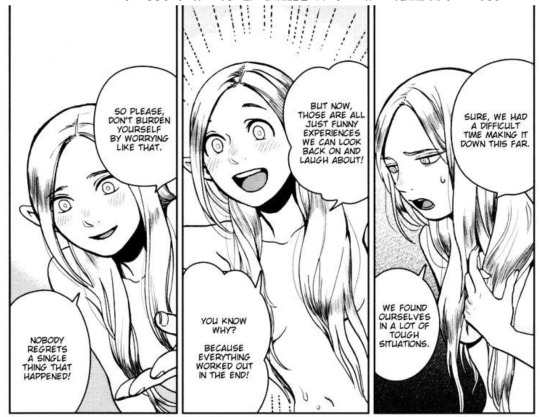
Marcille isn't actually addressing the question at all, not directly. She's deflecting, again. Oh we had a ~difficult time~, there were a lot of "tough situations." Even though she and Falin both know about the resurrection, and Falin has made it clear that she wants to talk about it, Marcille pushes away from the actual topic. She keeps things broad and indirect.
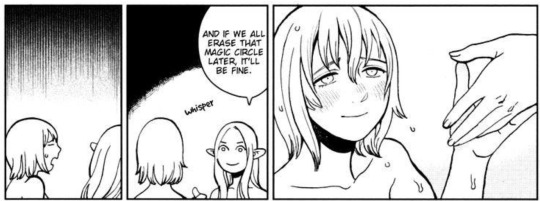
She offers the smallest gesture to Falin - nothing more than a whisper of 'don't worry about it I won't get in trouble' (even though Falin's concern was never just about Marcille getting in trouble).
Marcille then continues to deflect even further, completely changing the subject onto clothes and frog adventures, which seems to distract Falin as well, as she finally gives up on pushing.

And that's where the scene ends! Marcille pushes into Falin's space (without fully realizing), and Falin pushes back. She tries three times to get Marcille to acknowledge her wants, and three times Marcille rejects her, though she does eventually convey some truth. She is honest in her belief that Falin doesn't need to feel guilty, and that things will all work out, even as she continues to deflect the rest of the question. Falin finally accepts that, the topic of conversation changes, and we move on.
But there is a little bit more that happens between them. Towards the end of the chapter, they have this little 'oh no we have to share a bed' situation. Classic stuff.
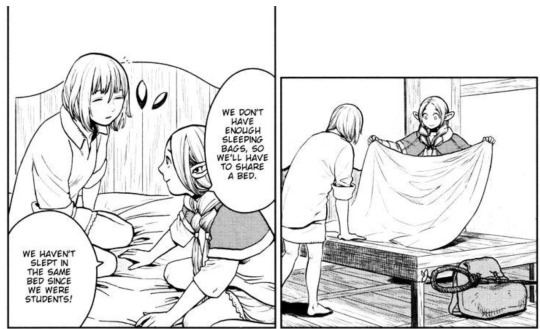
And Falin seems to realize that the context of this is kinda different now then it was when they were in the magic academy. She's not a kid any more, and they just had those intimate moments in the bath. There's a new tension between them, or one that new at least to the bed sharing of it all.

And in this respect, too Marcille pulls away from what Falin is trying to say. She tries to frame Falin as a kid, tries to insist that nothing is different.
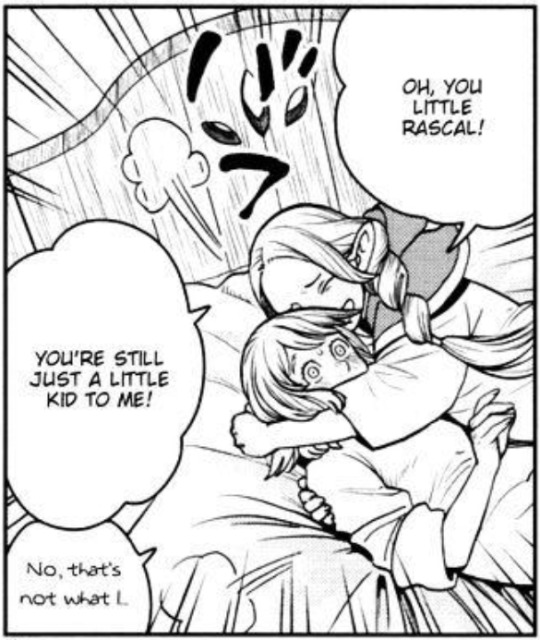
When I first got to this part, it honestly felt... a little uncomfortable? After the bath scene, it is really weird to move into a new intimate situation with Marcille explicitly treating Falin as a kid.
What I have realized in coming back to this scene, though, is how much I think its meant to feel uncomfortable. Throughout the chapter, Marcille's responses to Falin become increasingly patronizing. By letting some of that conflict between them resolve at the end of the first scene, the chapter seems to let things rest, and lets you set it out of your mind.
Then, when the same type of conflict comes back at the end of the chapter, Marcille is even more blatantly treating Falin like a kid, and the unfairness of it hits even stronger. They are both adults, and Falin deserves the truth. After 27 chapters from the perspective of Laios, Marcille, and the others in the group, this progression lets you feel things from Falin's perspective. It's supposed to feel uncomfortable because it IS uncomfortable for Falin, the way no one will quite tell her the truth.
After all, Marcille isn't the only one to do this kind of deflecting when Falin tries to ask about what happened. Laios has a similar response, right down to the 'treating her a bit like a kid' part.
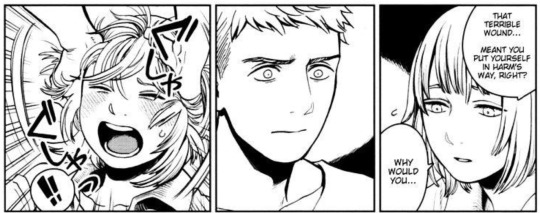
Even more importantly, this final conversation of the chapter reveals one last layer in the knowledge/power imbalance between Falin and the rest of the party: she doesn't actually remember sacrificing herself and teleporting them out.

As I mentioned before, that action was one of the most assertive things we see Falin do in the story, and she doesn't even get to keep that for herself. Instead of being her action, her choice, it becomes yet another thing that the others know more about than her.
I think that's part of why there is such an air of melancholy to this hug they share on the next page
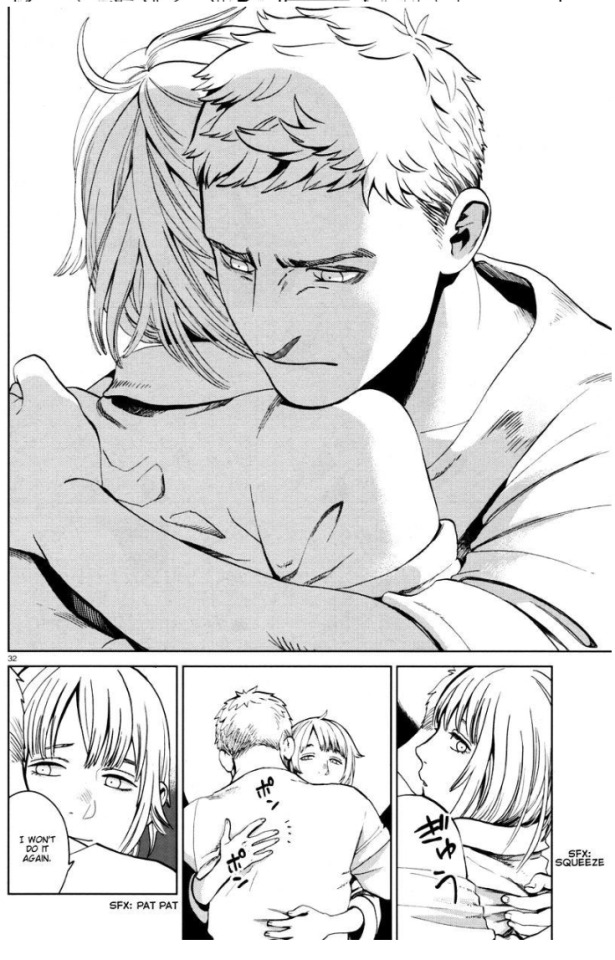
Obviously, obviously, there are so many emotions here for Laios and I don't think its all meant to be viewed as a negative thing, or that he or Marcille are being completely unreasonable. They've been through a lot, and what's more, they think they have time now. So much more time then they actually will have. Time to explain, to open up, to let Falin return to the group in full - as a teammate and not just as someone to be cared for and protected.
But they don't get time. And this relenting by Falin, this "I won't do it again," it's not something that feels triumphant. It's an attempt to comfort them, more a prayer than a promise. As if she is trying to exorcise a spirit. As if she is capable of promising that death won't come, eventually. It's what Laios needs, not what she wants.
That's the real tragedy of the chapter, I think. It's the one time, in the midst of everything, that they have the chance to give Falin what she wants - and they don't do it.
But I do think they realize that, and I think that this failure is a core part of their journey. It's another bittersweet taste to add to the mix - all the missed chances in this chapter to connect, amidst the moments of genuine peace they do get throughout it.
As Laios puts it later...
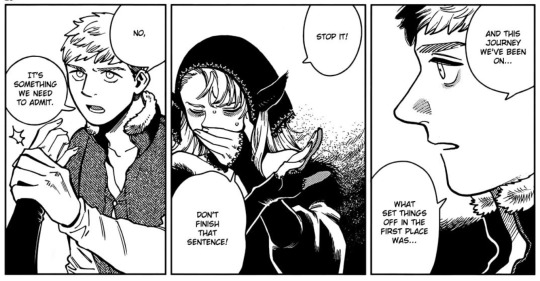
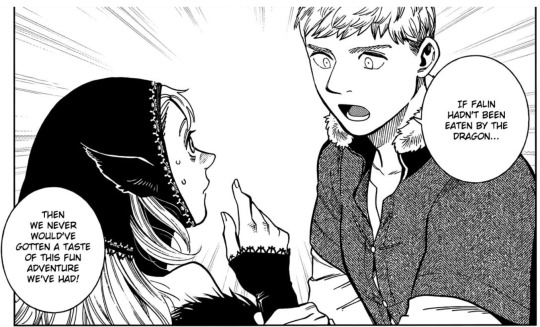
If Falin hadn't been eaten by the dragon, and perhaps if they hadn't failed her here, they never would have had the adventure that they got to share.
(or, perhaps more tactfully: in life & chapter 28, there are both good times and bad. Thanks, Chilchuk)
#dungeon meshi#delicious in dungeon#falin touden#marcille donato#laios touden#dunmeshi analysis#dungeon meshi spoilers
1K notes
·
View notes
Text
It still boggles my mind how one of the creepiest scenes I have read in a manga comes from dungeon meshi.
It's a scene that after I read it stayed impressed in my mind more than any other in the manga, I'm talking about the scene where the goat eats Mithrun desires

I think there are multiple reason why I find it so creepy.
The first is of course the goat itself.
While in the previous panels of the chapter we saw it grow until this point it always looked like a normal goat, so seeing it emerge as this giant monstrosity with humanoid hands without even knowing what it's going to do is dreadful.
The second is the setting.
Seeing it emerge from the darkness into the bedroom is evocative of a common childhood fear, and feels like a violation of what should be the safest of spaces.
The uncaring look on mithrun's lover face also adds to the creepy vibe, of the feeling of comfort and normal life being cut open to reveal it as being simply the spider web of a predator.
Finally is the act itself
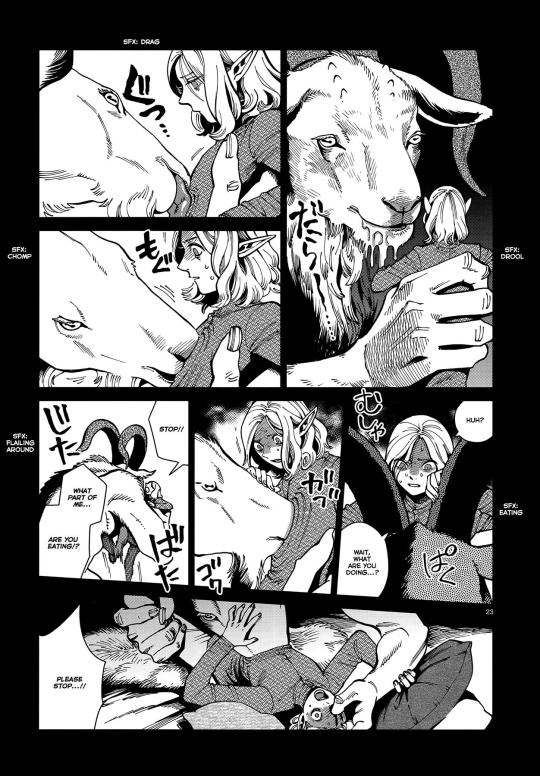
The way a still living person is treated as a meal by the demon is creepy in itself, but it's made so much worse by the way the demon eats: entering inside mithrun as if eating from a soup, while grabbing his legs to prevent a struggle.
His way of eating is a mix of animalistic and perversely human, which only adds to the feeling that this thing is not a monster but something else, something unnatural.
Interestingly ryoko kui achieves to be this unsettling with barely any gore, the little there is (mithrun's eye being caved) being treated almost like an afterthought both by the framing of the scene and by the goat itself
1K notes
·
View notes
Text
my controversial opinion is that i like that laios is bigger and more muscular than kabru because, as a poc, buff brown guy x scrawny white guy is so popular and tired, i like it whenever there’s a subversion of it from a work that’s well written. of course, not to mention that they have a very fun dynamic and the comic from the new official world guide spelling out for everyone that they do care about each other lol
i like that kabru does look feminine, especially when fandom makes the brown one always the bigger and masculine one in fanon and any instance of their delicate features is erased, even in yuri (looking at gwitch lol)
speaking of, i really like kikimari in that namari is portrayed as very masculine while kiki is feminine and elegant in fanwork
obviously, fandom isn’t activism duh, but i’m merely speaking from experience as someone who dabbles in both eastern and western fan spaces. i’ve seen it happen so many times that it’s become the staple so i love subversion that’s actually good
#dungeon meshi#labru#i also rly like that it’s kabru-centric#i’ve seen a lot of labru fans that like kabru more than they like laios#everyone who says “they’re making kabru laios’s accessory” dont engage w the content bc ive read so many good kabru analysis from labru fic#also labru fans r the only ones who make the connection that kabru’s story makes him a really good trans allegory DO I HAVE TO ELABORATE
856 notes
·
View notes